Editor's note: Frida Ghitis is a world affairs columnist for The Miami Herald and World Politics Review. A former CNN producer and correspondent, she is the author of "The End of Revolution: A Changing World in the Age of Live Television." Follow her on Twitter: @FridaGColumns.
(CNN) -- Presidents, prime ministers and assorted rulers, consider that you have been warned: A massive protest can start at any time, seemingly over any issue, and can grow to a size and intensity no one expected. Your country's image, your own prestige, could risk unraveling as you face the wrath of the people.
The newest iconic images from Turkey and from Brazil -- two countries that have promoted themselves as models to emulate -- include shocking scenes of police brutality, of government clampdown against peaceful protesters.
We have entered a new age of protests. While politics remain intensely local, individuals are more interconnected.
 Frida Ghitis
Frida Ghitis In Turkey, a small protest over plans to destroy one of Istanbul's last remaining parks exploded in size and intensity after a harsh police crackdown shocked the nation. The sight of police spraying giant clouds of tear gas and beating peaceful protesters touched a nerve, inflaming simmering concerns about an increasingly authoritarian regime.
In a matter of days, waves of demonstrations, the biggest in decades, spread across the country. Prime Minister Recep Tayip Erdogan, who has not lacked for self-confidence over his 10 years in power, came under sharp criticism over his response to the protests.
Has he grown arrogant with power? Having led his party to consecutive victories at the polls, sucking the air out of the powerful military, and overseeing Turkey's rise to new heights of prosperity and international assertiveness, all of a sudden he looked less awe-inspiring.
Erdogan may have faced down world leaders, but when he faced his own people he tarnished his image. He is now accused by many at home and abroad of lacking in democratic instincts.
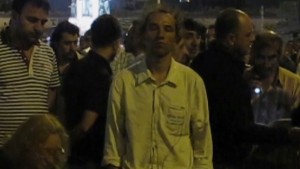 'Standing Man' protester inspires others
'Standing Man' protester inspires others 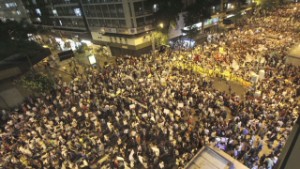 Brazilian FM responds to protests .cnnArticleGalleryNav{border:1px solid #000;cursor:pointer;float:left;height:25px;text-align:center;width:25px} .cnnArticleGalleryNavOn{background-color:#C03;border:1px solid #000;float:left;height:25px;text-align:center;width:20px} .cnnArticleGalleryNavDisabled{background-color:#222;border:1px solid #000;color:#666;float:left;height:25px;text-align:center;width:25px} .cnnArticleExpandableTarget{background-color:#000;display:none;position:absolute} .cnnArticlePhotoContainer{height:122px;width:214px} .cnnArticleBoxImage{cursor:pointer;height:122px;padding-top:0;width:214px} .cnnArticleGalleryCaptionControl{background-color:#000;color:#FFF} .cnnArticleGalleryCaptionControlText{cursor:pointer;float:right;font-size:10px;padding:3px 10px 3px 3px} .cnnArticleGalleryPhotoContainer cite{background:none repeat scroll 0 0 #000;bottom:48px;color:#FFF;height:auto;left:420px;opacity:.7;position:absolute;width:200px;padding:10px} .cnnArticleGalleryClose{background-color:#fff;display:block;text-align:right} .cnnArticleGalleryCloseButton{cursor:pointer} .cnnArticleGalleryNavPrevNext span{background-color:#444;color:#CCC;cursor:pointer;float:left;height:23px;text-align:center;width:26px;padding:4px 0 0} .cnnArticleGalleryNavPrevNextDisabled span{background-color:#444;color:#666;float:left;height:23px;text-align:center;width:25px;padding:4px 0 0} .cnnVerticalGalleryPhoto{padding-right:68px;width:270px;margin:0 auto} .cnnGalleryContainer{float:left;clear:left;margin:0 0 20px;padding:0 0 0 10px}
Brazilian FM responds to protests .cnnArticleGalleryNav{border:1px solid #000;cursor:pointer;float:left;height:25px;text-align:center;width:25px} .cnnArticleGalleryNavOn{background-color:#C03;border:1px solid #000;float:left;height:25px;text-align:center;width:20px} .cnnArticleGalleryNavDisabled{background-color:#222;border:1px solid #000;color:#666;float:left;height:25px;text-align:center;width:25px} .cnnArticleExpandableTarget{background-color:#000;display:none;position:absolute} .cnnArticlePhotoContainer{height:122px;width:214px} .cnnArticleBoxImage{cursor:pointer;height:122px;padding-top:0;width:214px} .cnnArticleGalleryCaptionControl{background-color:#000;color:#FFF} .cnnArticleGalleryCaptionControlText{cursor:pointer;float:right;font-size:10px;padding:3px 10px 3px 3px} .cnnArticleGalleryPhotoContainer cite{background:none repeat scroll 0 0 #000;bottom:48px;color:#FFF;height:auto;left:420px;opacity:.7;position:absolute;width:200px;padding:10px} .cnnArticleGalleryClose{background-color:#fff;display:block;text-align:right} .cnnArticleGalleryCloseButton{cursor:pointer} .cnnArticleGalleryNavPrevNext span{background-color:#444;color:#CCC;cursor:pointer;float:left;height:23px;text-align:center;width:26px;padding:4px 0 0} .cnnArticleGalleryNavPrevNextDisabled span{background-color:#444;color:#666;float:left;height:23px;text-align:center;width:25px;padding:4px 0 0} .cnnVerticalGalleryPhoto{padding-right:68px;width:270px;margin:0 auto} .cnnGalleryContainer{float:left;clear:left;margin:0 0 20px;padding:0 0 0 10px} 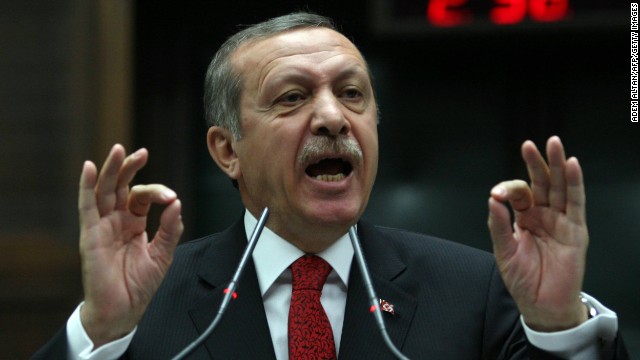 Turkish Prime Minister Recep Tayyip Erdogan speaks to the deputies of his ruling Justice and Development Party during a meeting with Turkish parliament on Tuesday, June 18. Erdogan said he had no intention of restricting anyone's democratic rights. "If you want to make a protest do it, do it, but do it within the framework of law," he said. Turkish performance artist Erdem Gunduz, center, is joined by others as he makes his silent protest in Taksim Square. As word of his gesture of protest spread, Gunduz became known as the "standing man." Protests that began as a demonstration against the planned demolition of a park have grown into general anti-government dissent across the nation. People carry the coffin of Ethem Sarisuluk, who was killed during recent protests in Turkey, on Sunday, June 16, in Ankara. Tens of thousands attend a rally to hear Turkish Prime Minister Recep Tayyip Erdogan speak in Istanbul on June 16, a day after he ordered a crackdown on anti-government protesters at Gezi Park. A protester faces water cannons during a clash with police at an anti-government demonstration in Ankara on June 16. Police walk through tear gas during protests at Kizilay Square in central Ankara on June 16. Police detain protesters after a crackdown on a demonstration at Istanbul's Gezi Park on June 16. A protester runs during clashes between riot police and demonstrators in the streets adjacent to Taksim Square in Istanbul on Sunday, June 16. A protester throws a tear gas canister back at riot police during clashes near Taksim Square on June 16. Trash containers burn in front of riot police forces in Ankara, Turkey, on June 16. Protesters gather in the main shopping street near Taksim Square in the early morning hours of June 16 as riot police clear Gezi Park in Istanbul. Turkish riot police officers use rubber bullets on June 15 to disperse demonstrators in Gezi Park in Istanbul on June 15. Protesters scramble for safety as Turkish riot police officers push them out of Gezi Park using tear gas and rubber bullets. Protesters run for cover as riot police spray them with a water cannon on June 15. A protester throws rocks at police during clashes at the entrance of Gezi Park on June 15. A protester on June 15, reacts in pain to a salvo of tear gas fired by Turkish riot police chasing out demonstrators in order to dismantle their tent camp in Gezi Park in Istanbul. Riot police move in a line through the tent camp on June 15. Protesters escape from tear gas during the crackdown at Gezi Park on June 15. Protestors fire fireworks as police drive them out of Gezi Park on June 15. Protesters sleep in Gezi Park in Istanbul's Taksim Square early Thursday, June 13. Turkey's prime minister on Thursday called on protesters camped out in the park to pack up and leave. A man plays piano for hundreds of protesters in Taksim Square on Wednesday, June 12, in Istanbul. A man waves a flag in Taksim Square on June 12. A man sleeps in Gezi Park in Istanbul's Taksim Square early on June 12, hours after riot police moved into the square in an attempt to push demonstrators out. Municipal workers clean up a street in Taksim Square early on June 12, after police moved in to disperse protesters. A protester prepares to throw a tear gas canister back toward police in Taksim Square on Tuesday, June 11. Riot police fire tear gas canisters at protesters in Taksim Square on June 11. People run from a tear gas cloud in Taksim Square on June 11. People flee as riot police fire tear gas on Taksim Square on June 11. Protesters run behind a barricade during clashes with police on June 11. A protester throws a tear gas canister back toward police on June 11. Photographers crowd around a protester posing in front of a riot police vehicle at Taksim Square on June 11. Protesters seek shelter behind a barricade on June 11. Protesters try to run from riot police on June 11. Riot police aim a water cannon at a protester as others take cover behind a makeshift shelter in Taksim Square on June 11. Police enter Taksim Square during clashes with protesters on June 11. Protesters take cover behind a barricade in Gezi Park in Istanbul on June 11. A protester uses a slingshot to throw stones at riot police on June 11. Protesters take cover behind a barricade in Taksim Square on June 11. A protester holds fireworks during clashes with riot police in Istabul on June 11. Riot police use water cannons and tear gas to disperse a crowd near Istabul's Taksim Square on June 11. A protester throws a tear gas canister back toward police on June 11. Riot police fire tear gas at demonstrators in Taksim Square on June 11. Police fire a water cannon at protesters on June 11. Protesters hold molotov cocktails in Taksim Square on June 11. A protester throws a stone during clashes with riot police on June 11. Protesters run from smoke as they clash with police in Istanbul on June 11. Protesters take cover behind a barricade as fireworks go off nearby on June 11. Medics carry Yasin Ayhan, 23, a protester who broke his leg in a raid early Monday, June 10, in Kugulu Park. Riot police doused thousands of protesters in Ankara with tear gas and jets of water for a second straight night. Protesters sleep at Taksim Square in central Istanbul on June 10. Prime Minister Recep Tayyip Erdogan warned protesters who have taken to the streets demanding his resignation that his patience has its limits and compared the unrest with an army attempt six years ago to curb his power. A demonstrator is detained by police officers as protests resumed in Kizilay Square in Ankara on Sunday, June 9. A demonstrator covers his face with a makeshift gas mask during protests in Kizilay Square in Ankara on June 9. Turkish Prime Minister Recep Tayyip Erdogan, left, and his wife, Emine, wave to supporters upon their arrival in Ankara on June 9. Erdogan told supporters that "even patience has an end" as he went on the offensive against mass protests that have consumed Ankara and Istanbul. Erdogan addresses supporters from the top of a bus as police stand guard at Esenboga International Airport in Ankara on June 9. Protesters gather during a demonstration at Taksim Square in Istanbul, on June 9. A demonstrator runs toward police during clashes with riot police in Istanbul, on Saturday, June 8. Demonstrators shout slogans as they gather at Kizilay Square in Ankara, Turkey, on June 8. Women sing as people gather at Kizilay Square in Ankara on June 8. Protesters rest in Gezi Park next to Taksim Square during a demonstration in Istanbul on Friday, June 7. Prime Minister Recep Tayyip Erdogan speaks during the opening session of the Ministry for European Union Affairs Conference on June 7 in Istanbul. Erdogan said today his Islamic-rooted government was open to "democratic demands" and hit back at EU criticism of his government's handling of a week of unrest. Supporters of Erdogan wave the Turkish flag upon the prime minister's arrival in Istanbul, on June 7. Protestors dance at Gezi Park in Taksim Square on Thursday, June 6. A man walks past damaged buses near Taksim Square on Thursday, June 6, in Istanbul, Turkey. A mother and her daughter read notes placed by protestors on a destroyed car in Taksim Square on June 6. Thousands of striking union members joined the anti-government protests on June 5, marching in Istanbul and Ankara in a sea of red and white union flags, drumming and yelling for Prime Minister Recep Tayyip Erdogan to resign. Protestors spend their day at Gezi Park on June 6. Protestors demonstrate near the office building of Turkish Prime Minister Recep Tayyip Erdogan in Istanbul early on June 6. A municipal worker collects garbage set on fire by Turkish protesters in a restaurant district of Ankara on June 5. A woman is wheeled away by paramedics during clashes on Kizilay Square in Ankara on Wednesday, June 5. Protesters confront police forces during riots in a restaurant district of Ankara, on June 5. Demonstrators run for cover as police use water cannons and tear gas on the crowd in Ankara on June 5. Protesters gather in Taksim Square as they shout slogans while protesting on Tuesday, June 4, in Istanbul, Turkey. Riot police fire tear gas at demonstrators in Istanbul on June 4. Paramedics carry a woman injured during clashes between demonstrators and riot police in Istanbul on June 4. Turkish police detain a demonstrator during clashes in Istanbul on June 4. A protester looks on during clashes with Turkish police outside of Prime Minister Recep Tayyip Erdogan's office, near Taksim Square in Istanbul on Tuesday, June 4. Demonstrators wave their national flag on June 4, during a protest in Ankara. Protesters cover their faces with plastic. After chaotic scenes in the streets Monday that continued late into the night and sent tear gas wafting through the air, the situation was relatively calm on Tuesday morning in Istanbul's central Taksim Square, near the park where the movement began. A demonstrator takes cover at a road block between Taksim and Besiktas in Istanbul on June 4. Protesters clash with riot police between Taksim and Besiktas in Istanbul on Monday, June 3. Protestors pass bricks for building barricades during clashes with riot police in Istanbul on June 3. Riot policemen unload tear gas during clashes in Istanbul on June 3. Protesters throw riot police's tear gas back at them in Istanbul on June 3. Protester wounds are treated during clashes in Istanbul on June 3. Demonstrators set up road blocks between Taksim and Besiktas. Barricades remain up around the square, and Erdogan's opponents appear determined to continue the demonstrations despite the prime minister's comment on June 3 that he expects the situation to return to normal "within a few days." A medical team tends to a protester. The Turkish Medical Association claimed that at least 3,195 people had been injured in clashes on June 1 and June 2. Only 26 of them were in serious or critical condition, it said. Protesters stand atop a pile of rubble during clashes with Turkish police on Monday, June 3. Turkish riot police fire tear gas canisters to disperse protesters near Taksim Square on June 3. Police officers tend to a demonstrator during the violent clashes in Istanbul on June 3. A protester waves the Turkish flag from a rooftop at Taksim Square on June 3 as large crowds continue to demonstrate below. A protester wears a gas mask as smoke from a burned car fills the air at Taksim Square on June 3. Despite Turkish Prime Minister Recep Tayyip Erdogan's call for calm on Monday, June 3, protests continued in Istanbul. Protesters carry the Turkish flag and shout against the government in Gezi Park near central Istanbul. After protests that lasted until the early morning, a protester sleeps in a damaged and vandalized vehicle in Taksim Square on June 3. Protests showed no sign of letting up on Monday, almost a week after a peaceful sit-in was met with a police crackdown, igniting the biggest anti-government riots the city has seen in a decade. A tired protester rests in front of the graffiti-sprayed wall of an information booth at Taksim Square in central Istanbul on June 3. Turkish protesters clash with riot police near the prime minister's office between Taksim and Besiktas early June 3. Protesters drive an excavator toward Turkish riot police as they make their way to Erdogan's office on June 3. During the clashes, volunteer doctors helped injured protesters in a mosque on June 3. A protester is silhouetted by a burning car at Taksim Square during clashes in the early morning of June 3. A protester covers his face on June 3 near Erdogan's office in Istanbul. Protesters clash with riot police in Istanbul on June 3. Protesters gather in Taksim Square in Istanbul on Sunday, June 2. Riot police fire tear gas during a protest against Turkey's Prime Minister Recep Tayyip Erdogan and his ruling AK Party in central Ankara on June 2. Sparked by the events in Istanbul, general anti-government protests have sprung up in Ankara. Demonstrators hide behind makeshift shields during clashes with Turkish riot police in Ankara on June 2. Police use a water cannon to disperse protesters outside Turkish Prime Minister Recep Tayyip Erdogan's working office in Istanbul on June 2. Protesters cling to a police vehicle mounted with a water canon in Istanbul on June 2. Turkish police detain a protester during demonstrations in Ankara on June 2. A protester flashes a victory sign as he takes part in a demonstration in Ankara on Saturday, June 1 in support of the protests in Istanbul against government plans to demolish a park. Protesters clash with riot police in Istanbul, Turkey, on Saturday, June 1. Protesters clash with riot police near Gezi Park on June 1. Earlier this week, several dozen activists tried to stage a sit-in at the park, the last bit of green space left in Istanbul's Taksim Square, the city's transit and commercial hub. Turkish protesters wearing gas masks face off against riot police near Istanbul's Taksim Square on June 1. Riot police use tear gas in an attempt to disperse the crowd of demonstrators on June 1. A man flees the clashes between Turkish protestors and riot police on June 1. On Friday, May 31, riot police stormed the growing camp in Gezi Park with water cannons and tear gas, pushing protesters into surrounding streets and triggering the clashes that have continued for more than 24 hours. The clashes damaged surrounding businesses in Istanbul and forced them to close on June 1. A man catches his breath behind the line where clashes are taking place on June 1. A pair of tourists gasp for air as riot police use tear gas and water cannons the fend off the demonstrators. Turkish security forces allowed small groups of pedestrians to travel through the square. Protesters buy gas masks from a local shop near the square on June 1. Riot police fire tear gas into the crowd of protesters overnight on Friday, May 31. Demonstrators set up barricades and build a fire as they clash with Turkish officers on May 31. Friends carry an injured protester on May 31. More than a dozen people have been injured in the clashes. Riot police use tear gas and water cannons to disperse a crowd at Taksim Square on May 31. An activist wearing a gas mask is enveloped in a cloud of tear gas on May 31. A crowd scatters during clashes on May 31, as one demonstrator throws back the tear gas canister that was launched by riot police. Protestors brace themselves as they are fired upon with a water canon by Turkish police forces. A large group of demonstrators gather to protest the demolition of Gezi Park in Taksim Square on May 31. A Turkish riot policeman uses tear gas in Taksim Square on May 28. Demonstrations in Turkey Demonstrations in Turkey Demonstrations in Turkey Demonstrations in Turkey Demonstrations in Turkey Demonstrations in Turkey Demonstrations in Turkey Demonstrations in Turkey Demonstrations in Turkey Demonstrations in Turkey Demonstrations in Turkey Demonstrations in Turkey Demonstrations in Turkey Demonstrations in Turkey Demonstrations in Turkey Demonstrations in Turkey Demonstrations in Turkey Demonstrations in Turkey Demonstrations in Turkey Demonstrations in Turkey Demonstrations in Turkey Demonstrations in Turkey Demonstrations in Turkey Demonstrations in Turkey Demonstrations in Turkey Demonstrations in Turkey Demonstrations in Turkey Demonstrations in Turkey Demonstrations in Turkey Demonstrations in Turkey Demonstrations in Turkey Demonstrations in Turkey Demonstrations in Turkey Demonstrations in Turkey Demonstrations in Turkey Demonstrations in Turkey Demonstrations in Turkey Demonstrations in Turkey Demonstrations in Turkey Demonstrations in Turkey Demonstrations in Turkey Demonstrations in Turkey Demonstrations in Turkey Demonstrations in Turkey Demonstrations in Turkey Demonstrations in Turkey Demonstrations in Turkey Demonstrations in Turkey Demonstrations in Turkey Demonstrations in Turkey Demonstrations in Turkey Demonstrations in Turkey Demonstrations in Turkey Demonstrations in Turkey Demonstrations in Turkey Demonstrations in Turkey Demonstrations in Turkey Demonstrations in Turkey Demonstrations in Turkey Demonstrations in Turkey Demonstrations in Turkey Demonstrations in Turkey Demonstrations in Turkey Demonstrations in Turkey Demonstrations in Turkey Demonstrations in Turkey Demonstrations in Turkey Demonstrations in Turkey Demonstrations in Turkey Demonstrations in Turkey Demonstrations in Turkey Demonstrations in Turkey Demonstrations in Turkey Demonstrations in Turkey Demonstrations in Turkey Demonstrations in Turkey Demonstrations in Turkey Demonstrations in Turkey Demonstrations in Turkey Demonstrations in Turkey Demonstrations in Turkey Demonstrations in Turkey Demonstrations in Turkey Demonstrations in Turkey Demonstrations in Turkey Demonstrations in Turkey Demonstrations in Turkey Demonstrations in Turkey Demonstrations in Turkey Demonstrations in Turkey Demonstrations in Turkey Demonstrations in Turkey Demonstrations in Turkey Demonstrations in Turkey Demonstrations in Turkey Demonstrations in Turkey Demonstrations in Turkey Demonstrations in Turkey Demonstrations in Turkey Demonstrations in Turkey Demonstrations in Turkey Demonstrations in Turkey Demonstrations in Turkey Demonstrations in Turkey Demonstrations in Turkey Demonstrations in Turkey Demonstrations in Turkey Demonstrations in Turkey Demonstrations in Turkey Demonstrations in Turkey Demonstrations in Turkey Demonstrations in Turkey Demonstrations in Turkey Demonstrations in Turkey Demonstrations in Turkey Demonstrations in Turkey Demonstrations in Turkey Demonstrations in Turkey Demonstrations in Turkey Demonstrations in Turkey Demonstrations in Turkey Demonstrations in Turkey Demonstrations in Turkey HIDE CAPTION << <
Turkish Prime Minister Recep Tayyip Erdogan speaks to the deputies of his ruling Justice and Development Party during a meeting with Turkish parliament on Tuesday, June 18. Erdogan said he had no intention of restricting anyone's democratic rights. "If you want to make a protest do it, do it, but do it within the framework of law," he said. Turkish performance artist Erdem Gunduz, center, is joined by others as he makes his silent protest in Taksim Square. As word of his gesture of protest spread, Gunduz became known as the "standing man." Protests that began as a demonstration against the planned demolition of a park have grown into general anti-government dissent across the nation. People carry the coffin of Ethem Sarisuluk, who was killed during recent protests in Turkey, on Sunday, June 16, in Ankara. Tens of thousands attend a rally to hear Turkish Prime Minister Recep Tayyip Erdogan speak in Istanbul on June 16, a day after he ordered a crackdown on anti-government protesters at Gezi Park. A protester faces water cannons during a clash with police at an anti-government demonstration in Ankara on June 16. Police walk through tear gas during protests at Kizilay Square in central Ankara on June 16. Police detain protesters after a crackdown on a demonstration at Istanbul's Gezi Park on June 16. A protester runs during clashes between riot police and demonstrators in the streets adjacent to Taksim Square in Istanbul on Sunday, June 16. A protester throws a tear gas canister back at riot police during clashes near Taksim Square on June 16. Trash containers burn in front of riot police forces in Ankara, Turkey, on June 16. Protesters gather in the main shopping street near Taksim Square in the early morning hours of June 16 as riot police clear Gezi Park in Istanbul. Turkish riot police officers use rubber bullets on June 15 to disperse demonstrators in Gezi Park in Istanbul on June 15. Protesters scramble for safety as Turkish riot police officers push them out of Gezi Park using tear gas and rubber bullets. Protesters run for cover as riot police spray them with a water cannon on June 15. A protester throws rocks at police during clashes at the entrance of Gezi Park on June 15. A protester on June 15, reacts in pain to a salvo of tear gas fired by Turkish riot police chasing out demonstrators in order to dismantle their tent camp in Gezi Park in Istanbul. Riot police move in a line through the tent camp on June 15. Protesters escape from tear gas during the crackdown at Gezi Park on June 15. Protestors fire fireworks as police drive them out of Gezi Park on June 15. Protesters sleep in Gezi Park in Istanbul's Taksim Square early Thursday, June 13. Turkey's prime minister on Thursday called on protesters camped out in the park to pack up and leave. A man plays piano for hundreds of protesters in Taksim Square on Wednesday, June 12, in Istanbul. A man waves a flag in Taksim Square on June 12. A man sleeps in Gezi Park in Istanbul's Taksim Square early on June 12, hours after riot police moved into the square in an attempt to push demonstrators out. Municipal workers clean up a street in Taksim Square early on June 12, after police moved in to disperse protesters. A protester prepares to throw a tear gas canister back toward police in Taksim Square on Tuesday, June 11. Riot police fire tear gas canisters at protesters in Taksim Square on June 11. People run from a tear gas cloud in Taksim Square on June 11. People flee as riot police fire tear gas on Taksim Square on June 11. Protesters run behind a barricade during clashes with police on June 11. A protester throws a tear gas canister back toward police on June 11. Photographers crowd around a protester posing in front of a riot police vehicle at Taksim Square on June 11. Protesters seek shelter behind a barricade on June 11. Protesters try to run from riot police on June 11. Riot police aim a water cannon at a protester as others take cover behind a makeshift shelter in Taksim Square on June 11. Police enter Taksim Square during clashes with protesters on June 11. Protesters take cover behind a barricade in Gezi Park in Istanbul on June 11. A protester uses a slingshot to throw stones at riot police on June 11. Protesters take cover behind a barricade in Taksim Square on June 11. A protester holds fireworks during clashes with riot police in Istabul on June 11. Riot police use water cannons and tear gas to disperse a crowd near Istabul's Taksim Square on June 11. A protester throws a tear gas canister back toward police on June 11. Riot police fire tear gas at demonstrators in Taksim Square on June 11. Police fire a water cannon at protesters on June 11. Protesters hold molotov cocktails in Taksim Square on June 11. A protester throws a stone during clashes with riot police on June 11. Protesters run from smoke as they clash with police in Istanbul on June 11. Protesters take cover behind a barricade as fireworks go off nearby on June 11. Medics carry Yasin Ayhan, 23, a protester who broke his leg in a raid early Monday, June 10, in Kugulu Park. Riot police doused thousands of protesters in Ankara with tear gas and jets of water for a second straight night. Protesters sleep at Taksim Square in central Istanbul on June 10. Prime Minister Recep Tayyip Erdogan warned protesters who have taken to the streets demanding his resignation that his patience has its limits and compared the unrest with an army attempt six years ago to curb his power. A demonstrator is detained by police officers as protests resumed in Kizilay Square in Ankara on Sunday, June 9. A demonstrator covers his face with a makeshift gas mask during protests in Kizilay Square in Ankara on June 9. Turkish Prime Minister Recep Tayyip Erdogan, left, and his wife, Emine, wave to supporters upon their arrival in Ankara on June 9. Erdogan told supporters that "even patience has an end" as he went on the offensive against mass protests that have consumed Ankara and Istanbul. Erdogan addresses supporters from the top of a bus as police stand guard at Esenboga International Airport in Ankara on June 9. Protesters gather during a demonstration at Taksim Square in Istanbul, on June 9. A demonstrator runs toward police during clashes with riot police in Istanbul, on Saturday, June 8. Demonstrators shout slogans as they gather at Kizilay Square in Ankara, Turkey, on June 8. Women sing as people gather at Kizilay Square in Ankara on June 8. Protesters rest in Gezi Park next to Taksim Square during a demonstration in Istanbul on Friday, June 7. Prime Minister Recep Tayyip Erdogan speaks during the opening session of the Ministry for European Union Affairs Conference on June 7 in Istanbul. Erdogan said today his Islamic-rooted government was open to "democratic demands" and hit back at EU criticism of his government's handling of a week of unrest. Supporters of Erdogan wave the Turkish flag upon the prime minister's arrival in Istanbul, on June 7. Protestors dance at Gezi Park in Taksim Square on Thursday, June 6. A man walks past damaged buses near Taksim Square on Thursday, June 6, in Istanbul, Turkey. A mother and her daughter read notes placed by protestors on a destroyed car in Taksim Square on June 6. Thousands of striking union members joined the anti-government protests on June 5, marching in Istanbul and Ankara in a sea of red and white union flags, drumming and yelling for Prime Minister Recep Tayyip Erdogan to resign. Protestors spend their day at Gezi Park on June 6. Protestors demonstrate near the office building of Turkish Prime Minister Recep Tayyip Erdogan in Istanbul early on June 6. A municipal worker collects garbage set on fire by Turkish protesters in a restaurant district of Ankara on June 5. A woman is wheeled away by paramedics during clashes on Kizilay Square in Ankara on Wednesday, June 5. Protesters confront police forces during riots in a restaurant district of Ankara, on June 5. Demonstrators run for cover as police use water cannons and tear gas on the crowd in Ankara on June 5. Protesters gather in Taksim Square as they shout slogans while protesting on Tuesday, June 4, in Istanbul, Turkey. Riot police fire tear gas at demonstrators in Istanbul on June 4. Paramedics carry a woman injured during clashes between demonstrators and riot police in Istanbul on June 4. Turkish police detain a demonstrator during clashes in Istanbul on June 4. A protester looks on during clashes with Turkish police outside of Prime Minister Recep Tayyip Erdogan's office, near Taksim Square in Istanbul on Tuesday, June 4. Demonstrators wave their national flag on June 4, during a protest in Ankara. Protesters cover their faces with plastic. After chaotic scenes in the streets Monday that continued late into the night and sent tear gas wafting through the air, the situation was relatively calm on Tuesday morning in Istanbul's central Taksim Square, near the park where the movement began. A demonstrator takes cover at a road block between Taksim and Besiktas in Istanbul on June 4. Protesters clash with riot police between Taksim and Besiktas in Istanbul on Monday, June 3. Protestors pass bricks for building barricades during clashes with riot police in Istanbul on June 3. Riot policemen unload tear gas during clashes in Istanbul on June 3. Protesters throw riot police's tear gas back at them in Istanbul on June 3. Protester wounds are treated during clashes in Istanbul on June 3. Demonstrators set up road blocks between Taksim and Besiktas. Barricades remain up around the square, and Erdogan's opponents appear determined to continue the demonstrations despite the prime minister's comment on June 3 that he expects the situation to return to normal "within a few days." A medical team tends to a protester. The Turkish Medical Association claimed that at least 3,195 people had been injured in clashes on June 1 and June 2. Only 26 of them were in serious or critical condition, it said. Protesters stand atop a pile of rubble during clashes with Turkish police on Monday, June 3. Turkish riot police fire tear gas canisters to disperse protesters near Taksim Square on June 3. Police officers tend to a demonstrator during the violent clashes in Istanbul on June 3. A protester waves the Turkish flag from a rooftop at Taksim Square on June 3 as large crowds continue to demonstrate below. A protester wears a gas mask as smoke from a burned car fills the air at Taksim Square on June 3. Despite Turkish Prime Minister Recep Tayyip Erdogan's call for calm on Monday, June 3, protests continued in Istanbul. Protesters carry the Turkish flag and shout against the government in Gezi Park near central Istanbul. After protests that lasted until the early morning, a protester sleeps in a damaged and vandalized vehicle in Taksim Square on June 3. Protests showed no sign of letting up on Monday, almost a week after a peaceful sit-in was met with a police crackdown, igniting the biggest anti-government riots the city has seen in a decade. A tired protester rests in front of the graffiti-sprayed wall of an information booth at Taksim Square in central Istanbul on June 3. Turkish protesters clash with riot police near the prime minister's office between Taksim and Besiktas early June 3. Protesters drive an excavator toward Turkish riot police as they make their way to Erdogan's office on June 3. During the clashes, volunteer doctors helped injured protesters in a mosque on June 3. A protester is silhouetted by a burning car at Taksim Square during clashes in the early morning of June 3. A protester covers his face on June 3 near Erdogan's office in Istanbul. Protesters clash with riot police in Istanbul on June 3. Protesters gather in Taksim Square in Istanbul on Sunday, June 2. Riot police fire tear gas during a protest against Turkey's Prime Minister Recep Tayyip Erdogan and his ruling AK Party in central Ankara on June 2. Sparked by the events in Istanbul, general anti-government protests have sprung up in Ankara. Demonstrators hide behind makeshift shields during clashes with Turkish riot police in Ankara on June 2. Police use a water cannon to disperse protesters outside Turkish Prime Minister Recep Tayyip Erdogan's working office in Istanbul on June 2. Protesters cling to a police vehicle mounted with a water canon in Istanbul on June 2. Turkish police detain a protester during demonstrations in Ankara on June 2. A protester flashes a victory sign as he takes part in a demonstration in Ankara on Saturday, June 1 in support of the protests in Istanbul against government plans to demolish a park. Protesters clash with riot police in Istanbul, Turkey, on Saturday, June 1. Protesters clash with riot police near Gezi Park on June 1. Earlier this week, several dozen activists tried to stage a sit-in at the park, the last bit of green space left in Istanbul's Taksim Square, the city's transit and commercial hub. Turkish protesters wearing gas masks face off against riot police near Istanbul's Taksim Square on June 1. Riot police use tear gas in an attempt to disperse the crowd of demonstrators on June 1. A man flees the clashes between Turkish protestors and riot police on June 1. On Friday, May 31, riot police stormed the growing camp in Gezi Park with water cannons and tear gas, pushing protesters into surrounding streets and triggering the clashes that have continued for more than 24 hours. The clashes damaged surrounding businesses in Istanbul and forced them to close on June 1. A man catches his breath behind the line where clashes are taking place on June 1. A pair of tourists gasp for air as riot police use tear gas and water cannons the fend off the demonstrators. Turkish security forces allowed small groups of pedestrians to travel through the square. Protesters buy gas masks from a local shop near the square on June 1. Riot police fire tear gas into the crowd of protesters overnight on Friday, May 31. Demonstrators set up barricades and build a fire as they clash with Turkish officers on May 31. Friends carry an injured protester on May 31. More than a dozen people have been injured in the clashes. Riot police use tear gas and water cannons to disperse a crowd at Taksim Square on May 31. An activist wearing a gas mask is enveloped in a cloud of tear gas on May 31. A crowd scatters during clashes on May 31, as one demonstrator throws back the tear gas canister that was launched by riot police. Protestors brace themselves as they are fired upon with a water canon by Turkish police forces. A large group of demonstrators gather to protest the demolition of Gezi Park in Taksim Square on May 31. A Turkish riot policeman uses tear gas in Taksim Square on May 28. Demonstrations in Turkey Demonstrations in Turkey Demonstrations in Turkey Demonstrations in Turkey Demonstrations in Turkey Demonstrations in Turkey Demonstrations in Turkey Demonstrations in Turkey Demonstrations in Turkey Demonstrations in Turkey Demonstrations in Turkey Demonstrations in Turkey Demonstrations in Turkey Demonstrations in Turkey Demonstrations in Turkey Demonstrations in Turkey Demonstrations in Turkey Demonstrations in Turkey Demonstrations in Turkey Demonstrations in Turkey Demonstrations in Turkey Demonstrations in Turkey Demonstrations in Turkey Demonstrations in Turkey Demonstrations in Turkey Demonstrations in Turkey Demonstrations in Turkey Demonstrations in Turkey Demonstrations in Turkey Demonstrations in Turkey Demonstrations in Turkey Demonstrations in Turkey Demonstrations in Turkey Demonstrations in Turkey Demonstrations in Turkey Demonstrations in Turkey Demonstrations in Turkey Demonstrations in Turkey Demonstrations in Turkey Demonstrations in Turkey Demonstrations in Turkey Demonstrations in Turkey Demonstrations in Turkey Demonstrations in Turkey Demonstrations in Turkey Demonstrations in Turkey Demonstrations in Turkey Demonstrations in Turkey Demonstrations in Turkey Demonstrations in Turkey Demonstrations in Turkey Demonstrations in Turkey Demonstrations in Turkey Demonstrations in Turkey Demonstrations in Turkey Demonstrations in Turkey Demonstrations in Turkey Demonstrations in Turkey Demonstrations in Turkey Demonstrations in Turkey Demonstrations in Turkey Demonstrations in Turkey Demonstrations in Turkey Demonstrations in Turkey Demonstrations in Turkey Demonstrations in Turkey Demonstrations in Turkey Demonstrations in Turkey Demonstrations in Turkey Demonstrations in Turkey Demonstrations in Turkey Demonstrations in Turkey Demonstrations in Turkey Demonstrations in Turkey Demonstrations in Turkey Demonstrations in Turkey Demonstrations in Turkey Demonstrations in Turkey Demonstrations in Turkey Demonstrations in Turkey Demonstrations in Turkey Demonstrations in Turkey Demonstrations in Turkey Demonstrations in Turkey Demonstrations in Turkey Demonstrations in Turkey Demonstrations in Turkey Demonstrations in Turkey Demonstrations in Turkey Demonstrations in Turkey Demonstrations in Turkey Demonstrations in Turkey Demonstrations in Turkey Demonstrations in Turkey Demonstrations in Turkey Demonstrations in Turkey Demonstrations in Turkey Demonstrations in Turkey Demonstrations in Turkey Demonstrations in Turkey Demonstrations in Turkey Demonstrations in Turkey Demonstrations in Turkey Demonstrations in Turkey Demonstrations in Turkey Demonstrations in Turkey Demonstrations in Turkey Demonstrations in Turkey Demonstrations in Turkey Demonstrations in Turkey Demonstrations in Turkey Demonstrations in Turkey Demonstrations in Turkey Demonstrations in Turkey Demonstrations in Turkey Demonstrations in Turkey Demonstrations in Turkey Demonstrations in Turkey Demonstrations in Turkey Demonstrations in Turkey Demonstrations in Turkey Demonstrations in Turkey Demonstrations in Turkey HIDE CAPTION << <  1
1  2
2  3
3  4
4  5
5  6
6  7
7  8
8  9
9  10
10  11
11  12
12  13
13  14
14  15
15  16
16  17
17  18
18  19
19  20
20  21
21  22
22  23
23  24
24  25
25  26
26  27
27  28
28  29
29  30
30  31
31  32
32  33
33  34
34  35
35  36
36  37
37  38
38  39
39  40
40  41
41  42
42  43
43  44
44  45
45  46
46  47
47  48
48  49
49  50
50  51
51  52
52  53
53  54
54  55
55  56
56  57
57  58
58  59
59  60
60  61
61  62
62  63
63  64
64  65
65  66
66  67
67  68
68  69
69  70
70  71
71  72
72  73
73  74
74  75
75  76
76  77
77  78
78  79
79  80
80  81
81  82
82  83
83  84
84  85
85  86
86  87
87  88
88  89
89  90
90  91
91  92
92  93
93  94
94  95
95  96
96  97
97  98
98  99
99  100
100  101
101  102
102  103
103  104
104  105
105  106
106  107
107  108
108  109
109  110
110  111
111  112
112  113
113  114
114  115
115  116
116  117
117  118
118  119
119  120
120  121
121  122
122  123 > >>
123 > >>  Photos: Demonstrations in Turkey
Photos: Demonstrations in Turkey The country has new national icons. The newest is the "Standing Man," a protester who steadfastly held his ground amid the chaos, standing for hours gazing at a picture of Mustafa Kemal Ataturk. There's the "woman in red," a modernly dressed woman -- symbolizing the secular, world of personal freedom many of the demonstrators seek to defend.
A similar image emerged from Brazil. A young woman who appears utterly harmless was sprayed in the face by a policeman dressed in full riot gear.
Just like Turkey, no one could have predicted the turn of events in Brazil. A country that has symbolized Latin America's dramatic rise from poverty, where left-leaning governments have combined social programs and market-friendly policies, nearly eradicating extreme poverty, suddenly erupted in a wave of popular fury. The government of President Dilma Rousseff faced the largest protests in 20 years. And it all started over an increase in bus fares.
The protests over bus fares touched on worries about a slowdown in the economy, about persistent inequality, corruption and costly projects in preparation for hosting the upcoming World Cup and Olympic Games.
Rousseff, a former revolutionary herself, has been taking a much more conciliatory approach than the pugnacious Erdogan. On Wednesday, government officials in San Paulo and Rio de Janeiro announced that they would revoke the hike in bus fares in their cities.
In this era of connectivity, a small complaint can explode. Politicians may outmaneuver rival parties during election campaigns. They can claim a majority at the polls -- as Erdogan doesn't tire of remarking he has -- and they can ply their trade on the global stage. But they now have to deal with their citizens' demands in a much more public way.
Popular claims have new strength in our age of social media. It's impossible to predict which issue will find flammable material hiding in shared resentments and ignite raging fires of discontent.
The water cannons and the tear gas may disperse the first wave of protesters, but a click of a smartphone can produce a photo or video that instantly catches people's attention, potentially attracting even larger protests. The crowd may grow if its concerns are ignored, especially if police repression is violent.
One of the challenges for democratic governments is to balance what may be legitimate requirements of public order with a reasonable hearing for reasonable demands.
That is the response that separates the tyrants from the democrats.
Public space occupations and demonstrations have occurred in nations without democracy. We saw how regimes responded to protests in places like Egypt and Syria. We have seen crackdowns in Russia last year and in Iran after the 2009 elections.
These new protests start over smaller issues -- not over tyranny or basic democratic rights.
Local issues have a new power to surge with little warning, electrifying the crowds, jolting people out of complacency. Governments can be caught by surprise by what seem like trivial matters -- a small rise in bus fare or saving trees in a park.
It wasn't very long ago when every meeting of the powerful nations, of the International Monetary Fund and the World Bank, brought out angry anti-globalization crowds. Now, the concerns are more immediate, more personal.
When President Obama arrived in Northern Ireland on Monday for the meeting of the G8 nations, there were more police officers than protesters. The nature of protest has changed.
Governments may have the power to spy on citizens, to read their e-mails and listen to their conversations. But they have largely lost their ability to control the information that is out there. Governments have lost the power to change the subject, to divert attention, to blame a multinational institution or another country for the woes at home. Stories now refuse to die. Protesters, if angered by the government's response, are more likely to persevere.
Heads of government cannot control their public image the way they once could. The demigods are dying. New technology may make it easier for governments to learn what the people are thinking, but it makes it harder for them to shape what the people believe.
It's a new age. They should consider themselves warned.
Follow us on Twitter @CNNOpinion.
Join us on Facebook/CNNOpinion.
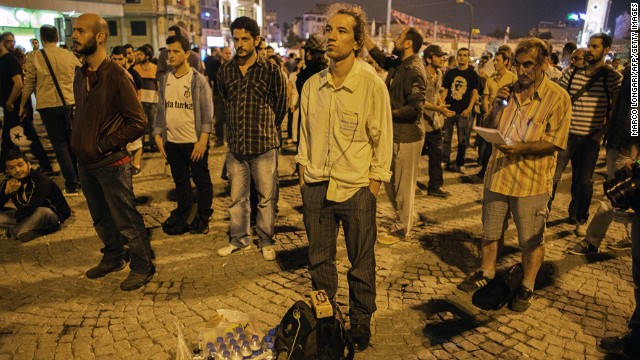 Turkish performance artist Erdem Gunduz, center, is joined by others as he makes his silent protest in Taksim Square. As word of his gesture of protest spread, Gunduz became known as the "standing man." Protests that began as a demonstration against the planned demolition of a park have grown into general anti-government dissent across the nation.
Turkish performance artist Erdem Gunduz, center, is joined by others as he makes his silent protest in Taksim Square. As word of his gesture of protest spread, Gunduz became known as the "standing man." Protests that began as a demonstration against the planned demolition of a park have grown into general anti-government dissent across the nation. 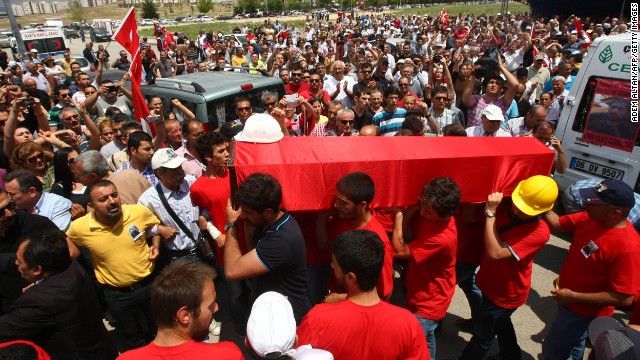 People carry the coffin of Ethem Sarisuluk, who was killed during recent protests in Turkey, on Sunday, June 16, in Ankara.
People carry the coffin of Ethem Sarisuluk, who was killed during recent protests in Turkey, on Sunday, June 16, in Ankara. 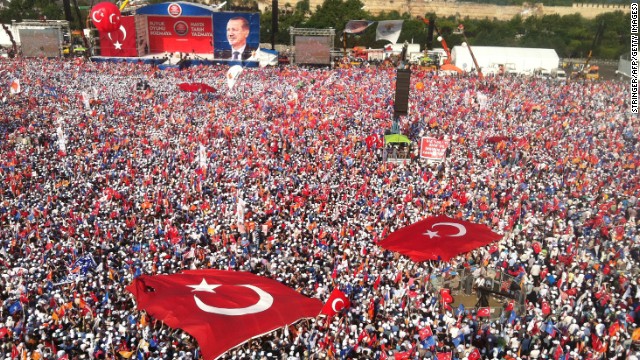 Tens of thousands attend a rally to hear Turkish Prime Minister Recep Tayyip Erdogan speak in Istanbul on June 16, a day after he ordered a crackdown on anti-government protesters at Gezi Park.
Tens of thousands attend a rally to hear Turkish Prime Minister Recep Tayyip Erdogan speak in Istanbul on June 16, a day after he ordered a crackdown on anti-government protesters at Gezi Park. 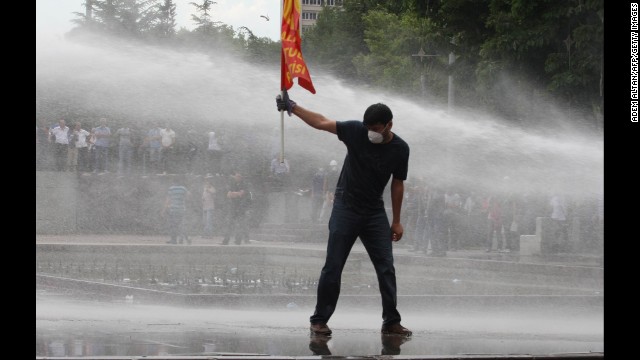 A protester faces water cannons during a clash with police at an anti-government demonstration in Ankara on June 16.
A protester faces water cannons during a clash with police at an anti-government demonstration in Ankara on June 16. 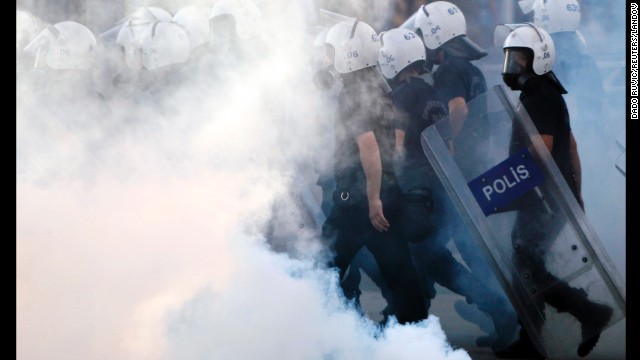 Police walk through tear gas during protests at Kizilay Square in central Ankara on June 16.
Police walk through tear gas during protests at Kizilay Square in central Ankara on June 16. 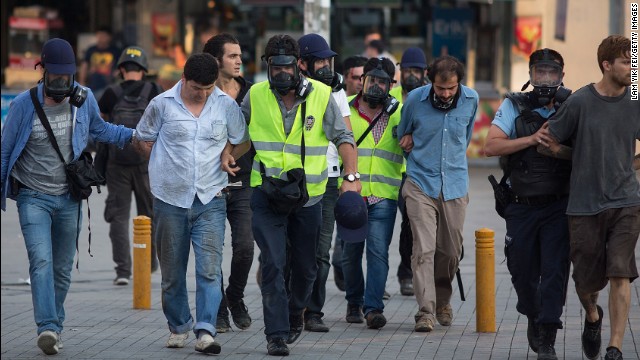 Police detain protesters after a crackdown on a demonstration at Istanbul's Gezi Park on June 16.
Police detain protesters after a crackdown on a demonstration at Istanbul's Gezi Park on June 16. 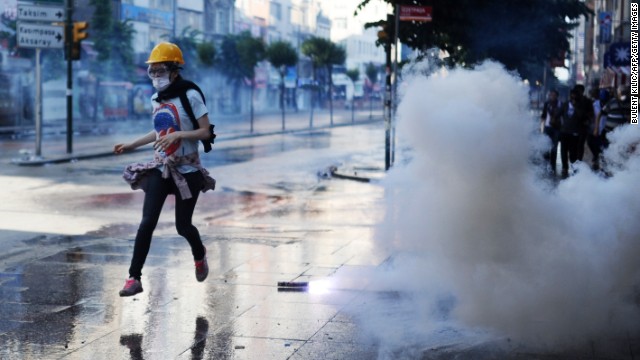 A protester runs during clashes between riot police and demonstrators in the streets adjacent to Taksim Square in Istanbul on Sunday, June 16.
A protester runs during clashes between riot police and demonstrators in the streets adjacent to Taksim Square in Istanbul on Sunday, June 16. 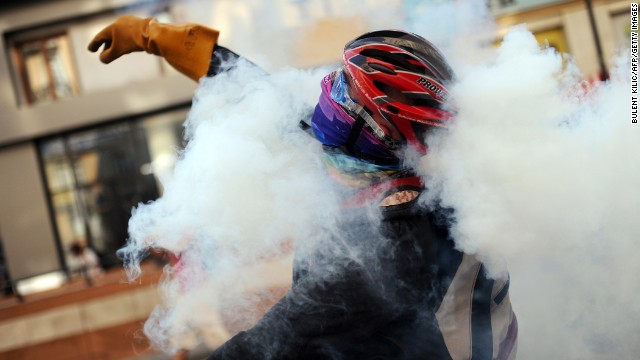 A protester throws a tear gas canister back at riot police during clashes near Taksim Square on June 16.
A protester throws a tear gas canister back at riot police during clashes near Taksim Square on June 16. 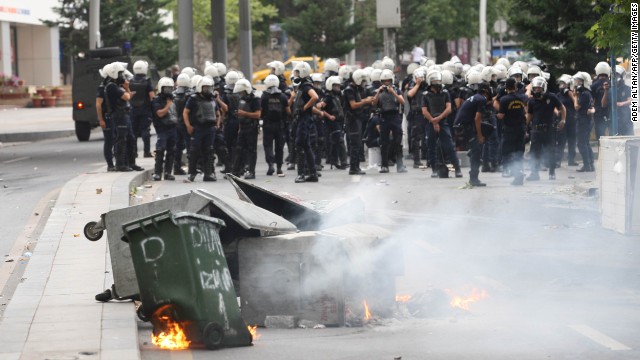 Trash containers burn in front of riot police forces in Ankara, Turkey, on June 16.
Trash containers burn in front of riot police forces in Ankara, Turkey, on June 16. 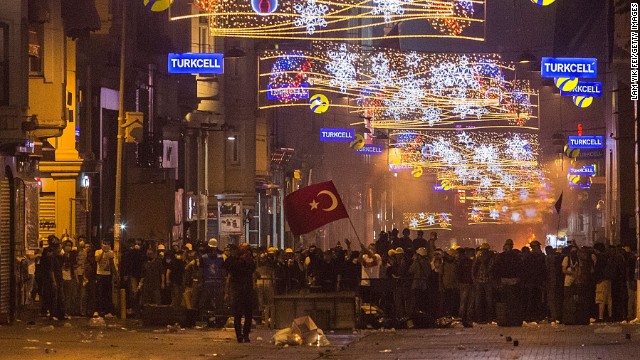 Protesters gather in the main shopping street near Taksim Square in the early morning hours of June 16 as riot police clear Gezi Park in Istanbul.
Protesters gather in the main shopping street near Taksim Square in the early morning hours of June 16 as riot police clear Gezi Park in Istanbul. 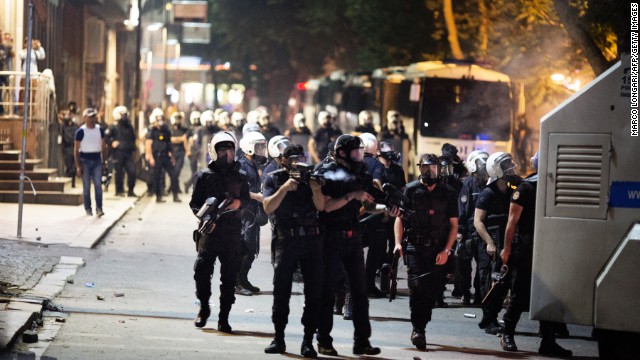 Turkish riot police officers use rubber bullets on June 15 to disperse demonstrators in Gezi Park in Istanbul on June 15.
Turkish riot police officers use rubber bullets on June 15 to disperse demonstrators in Gezi Park in Istanbul on June 15. 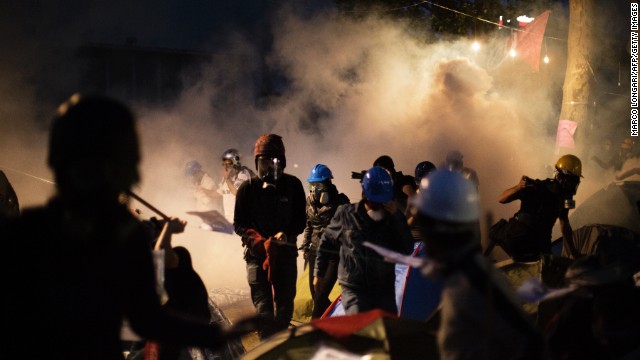 Protesters scramble for safety as Turkish riot police officers push them out of Gezi Park using tear gas and rubber bullets.
Protesters scramble for safety as Turkish riot police officers push them out of Gezi Park using tear gas and rubber bullets. 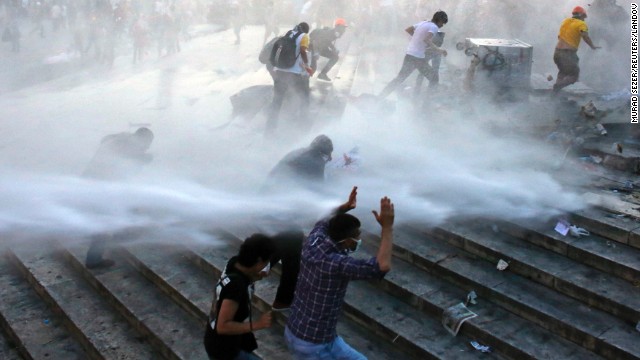 Protesters run for cover as riot police spray them with a water cannon on June 15.
Protesters run for cover as riot police spray them with a water cannon on June 15. 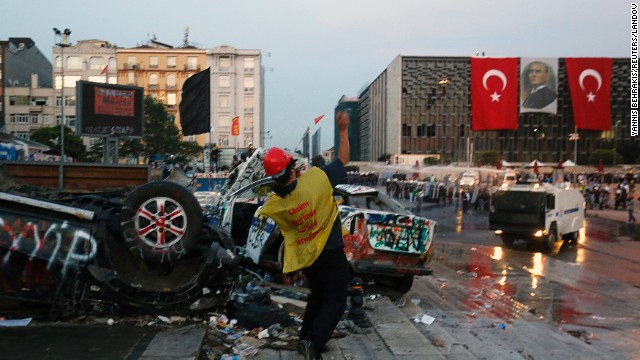 A protester throws rocks at police during clashes at the entrance of Gezi Park on June 15.
A protester throws rocks at police during clashes at the entrance of Gezi Park on June 15. 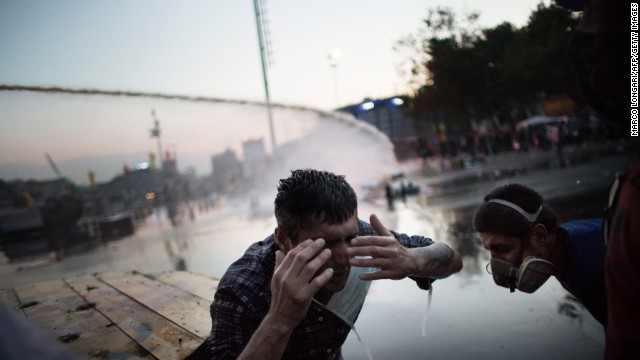 A protester on June 15, reacts in pain to a salvo of tear gas fired by Turkish riot police chasing out demonstrators in order to dismantle their tent camp in Gezi Park in Istanbul.
A protester on June 15, reacts in pain to a salvo of tear gas fired by Turkish riot police chasing out demonstrators in order to dismantle their tent camp in Gezi Park in Istanbul. 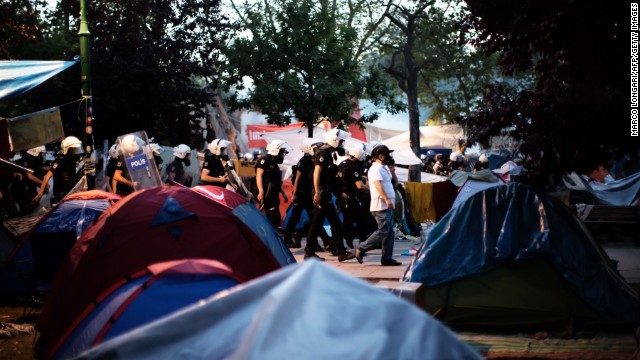 Riot police move in a line through the tent camp on June 15.
Riot police move in a line through the tent camp on June 15. 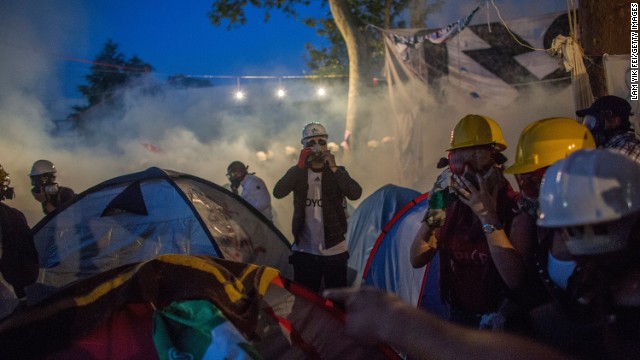 Protesters escape from tear gas during the crackdown at Gezi Park on June 15.
Protesters escape from tear gas during the crackdown at Gezi Park on June 15. 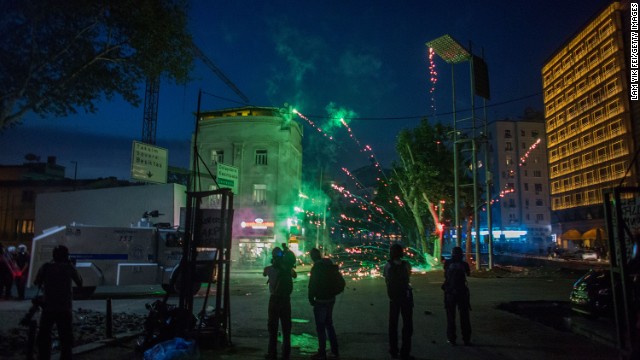 Protestors fire fireworks as police drive them out of Gezi Park on June 15.
Protestors fire fireworks as police drive them out of Gezi Park on June 15. 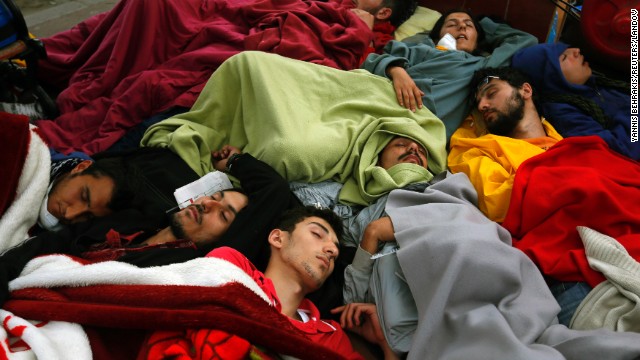 Protesters sleep in Gezi Park in Istanbul's Taksim Square early Thursday, June 13. Turkey's prime minister on Thursday called on protesters camped out in the park to pack up and leave.
Protesters sleep in Gezi Park in Istanbul's Taksim Square early Thursday, June 13. Turkey's prime minister on Thursday called on protesters camped out in the park to pack up and leave. 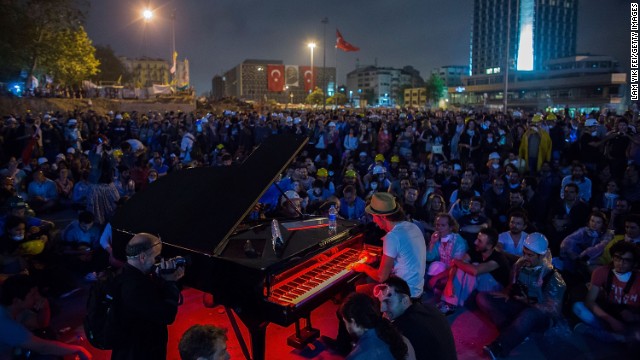 A man plays piano for hundreds of protesters in Taksim Square on Wednesday, June 12, in Istanbul.
A man plays piano for hundreds of protesters in Taksim Square on Wednesday, June 12, in Istanbul. 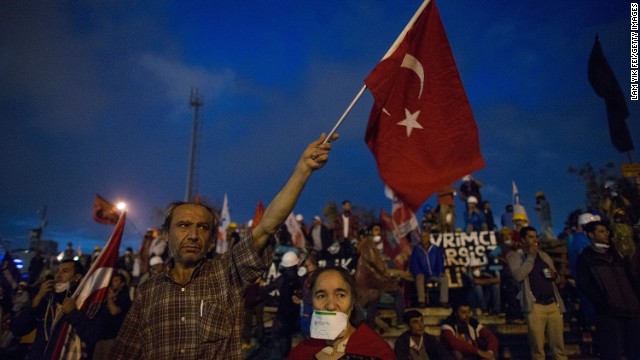 A man waves a flag in Taksim Square on June 12.
A man waves a flag in Taksim Square on June 12.  A man sleeps in Gezi Park in Istanbul's Taksim Square early on June 12, hours after riot police moved into the square in an attempt to push demonstrators out.
A man sleeps in Gezi Park in Istanbul's Taksim Square early on June 12, hours after riot police moved into the square in an attempt to push demonstrators out. 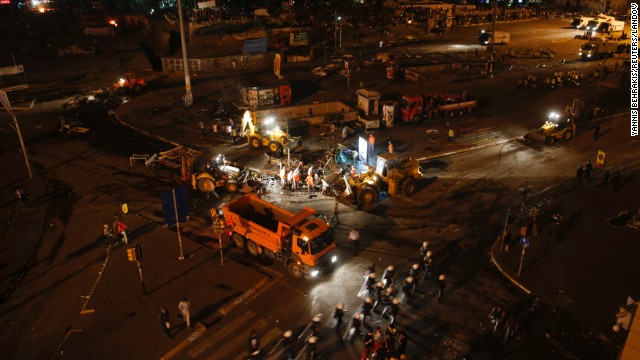 Municipal workers clean up a street in Taksim Square early on June 12, after police moved in to disperse protesters.
Municipal workers clean up a street in Taksim Square early on June 12, after police moved in to disperse protesters. 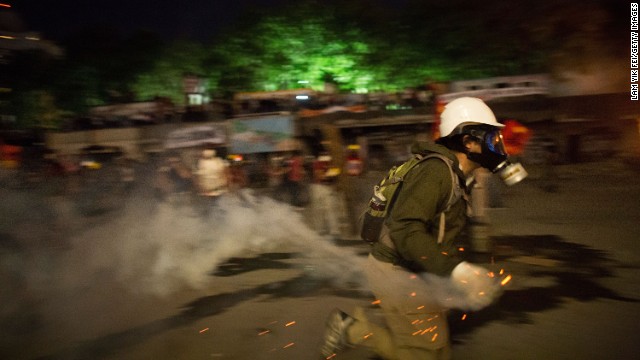 A protester prepares to throw a tear gas canister back toward police in Taksim Square on Tuesday, June 11.
A protester prepares to throw a tear gas canister back toward police in Taksim Square on Tuesday, June 11. 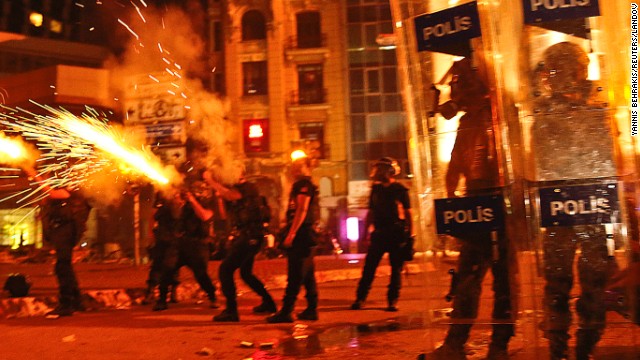 Riot police fire tear gas canisters at protesters in Taksim Square on June 11.
Riot police fire tear gas canisters at protesters in Taksim Square on June 11. 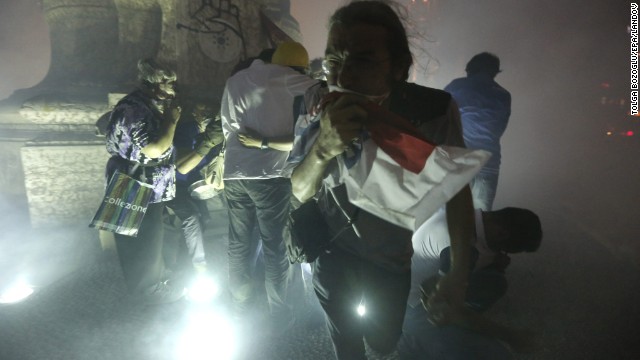 People run from a tear gas cloud in Taksim Square on June 11.
People run from a tear gas cloud in Taksim Square on June 11. 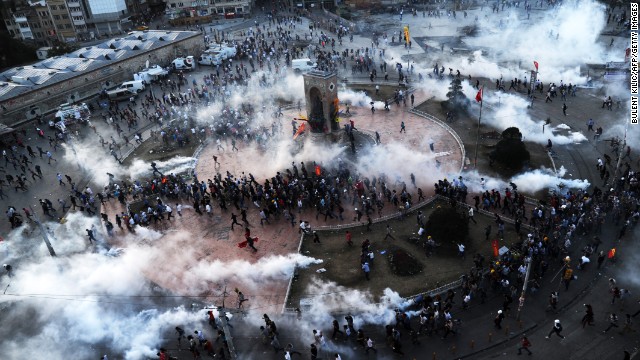 People flee as riot police fire tear gas on Taksim Square on June 11.
People flee as riot police fire tear gas on Taksim Square on June 11. 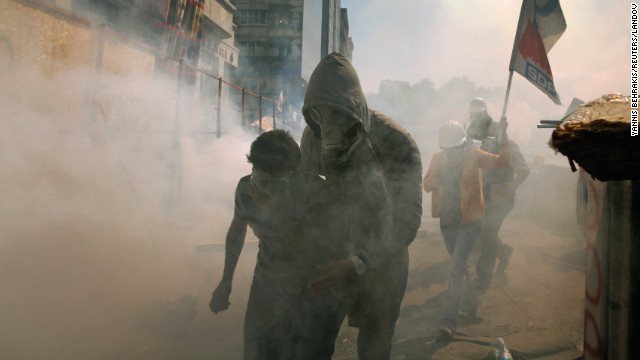 Protesters run behind a barricade during clashes with police on June 11.
Protesters run behind a barricade during clashes with police on June 11. 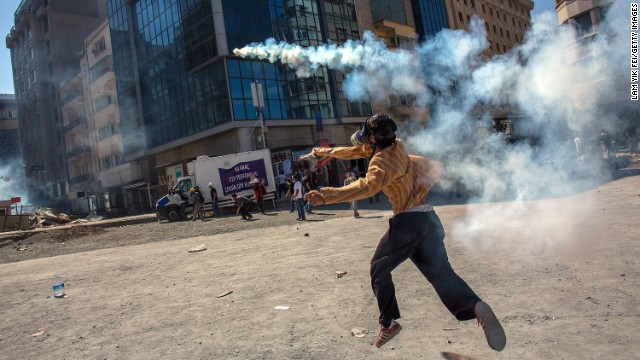 A protester throws a tear gas canister back toward police on June 11.
A protester throws a tear gas canister back toward police on June 11. 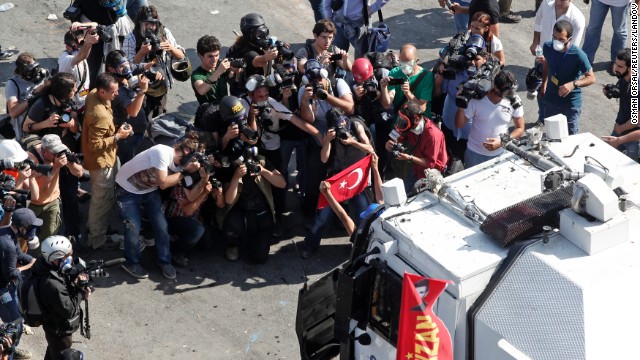 Photographers crowd around a protester posing in front of a riot police vehicle at Taksim Square on June 11.
Photographers crowd around a protester posing in front of a riot police vehicle at Taksim Square on June 11. 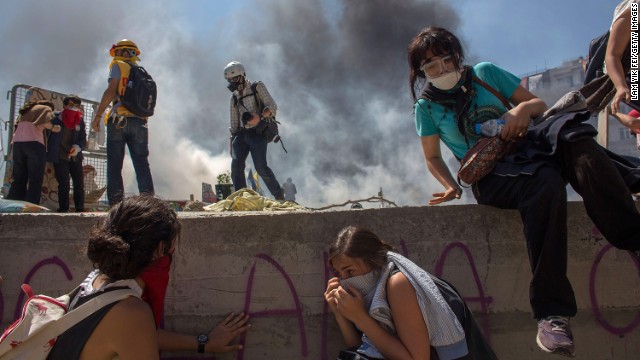 Protesters seek shelter behind a barricade on June 11.
Protesters seek shelter behind a barricade on June 11. 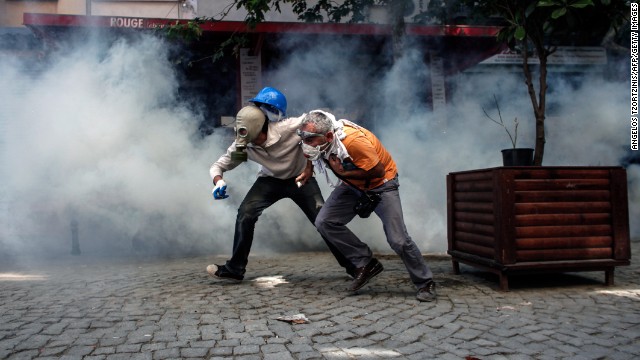 Protesters try to run from riot police on June 11.
Protesters try to run from riot police on June 11. 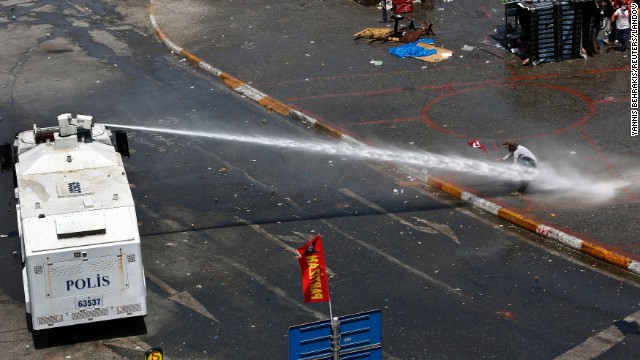 Riot police aim a water cannon at a protester as others take cover behind a makeshift shelter in Taksim Square on June 11.
Riot police aim a water cannon at a protester as others take cover behind a makeshift shelter in Taksim Square on June 11. 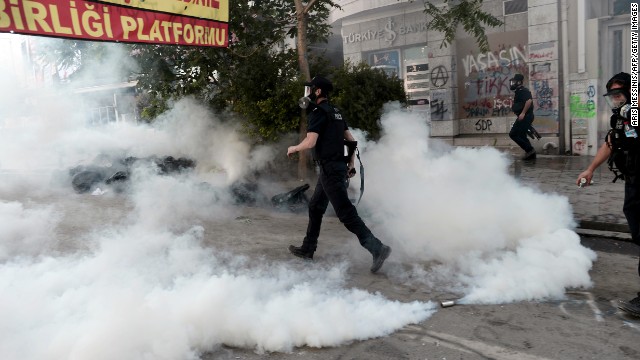 Police enter Taksim Square during clashes with protesters on June 11.
Police enter Taksim Square during clashes with protesters on June 11. 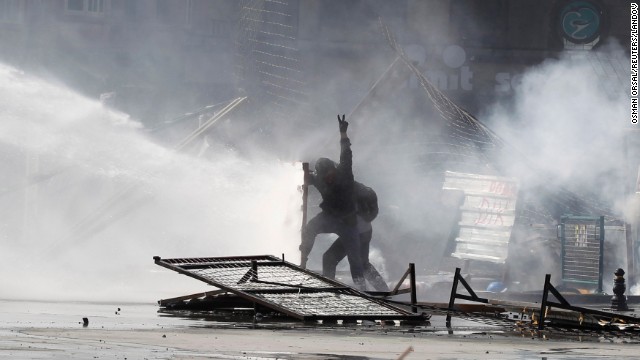 Protesters take cover behind a barricade in Gezi Park in Istanbul on June 11.
Protesters take cover behind a barricade in Gezi Park in Istanbul on June 11. 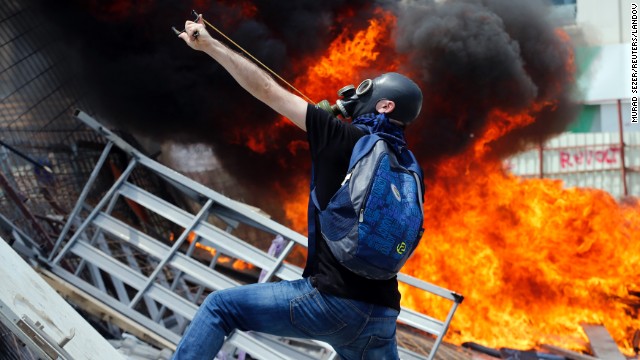 A protester uses a slingshot to throw stones at riot police on June 11.
A protester uses a slingshot to throw stones at riot police on June 11. 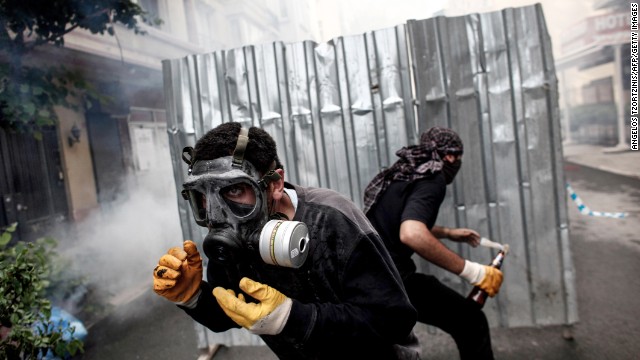 Protesters take cover behind a barricade in Taksim Square on June 11.
Protesters take cover behind a barricade in Taksim Square on June 11. 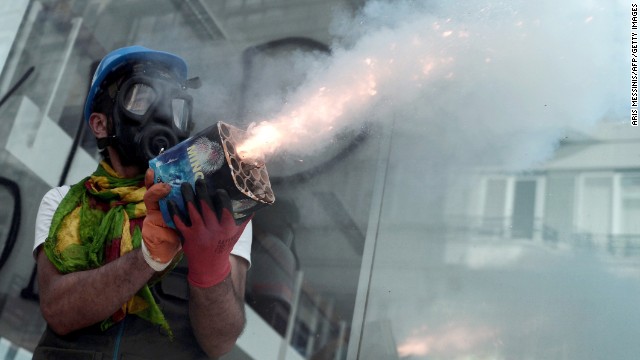 A protester holds fireworks during clashes with riot police in Istabul on June 11.
A protester holds fireworks during clashes with riot police in Istabul on June 11. 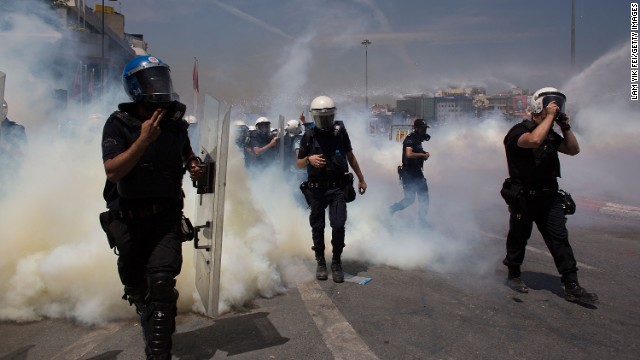 Riot police use water cannons and tear gas to disperse a crowd near Istabul's Taksim Square on June 11.
Riot police use water cannons and tear gas to disperse a crowd near Istabul's Taksim Square on June 11. 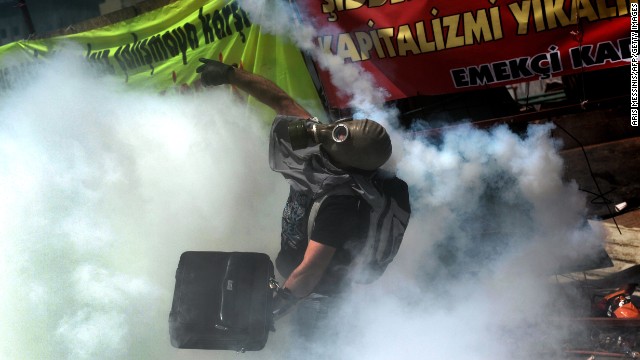 A protester throws a tear gas canister back toward police on June 11.
A protester throws a tear gas canister back toward police on June 11. 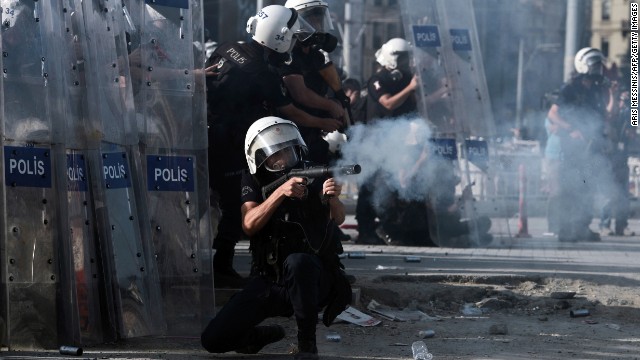 Riot police fire tear gas at demonstrators in Taksim Square on June 11.
Riot police fire tear gas at demonstrators in Taksim Square on June 11. 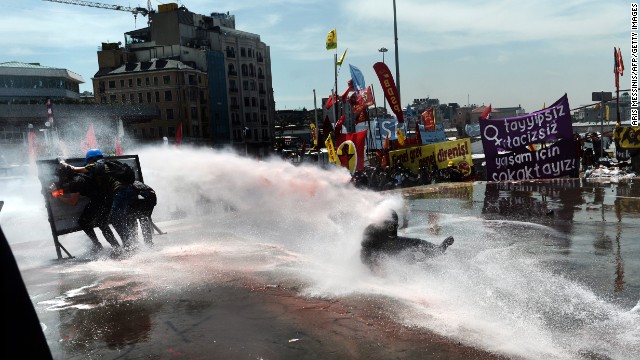 Police fire a water cannon at protesters on June 11.
Police fire a water cannon at protesters on June 11. 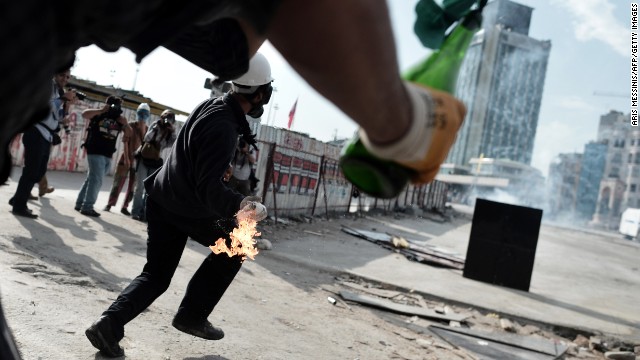 Protesters hold molotov cocktails in Taksim Square on June 11.
Protesters hold molotov cocktails in Taksim Square on June 11. 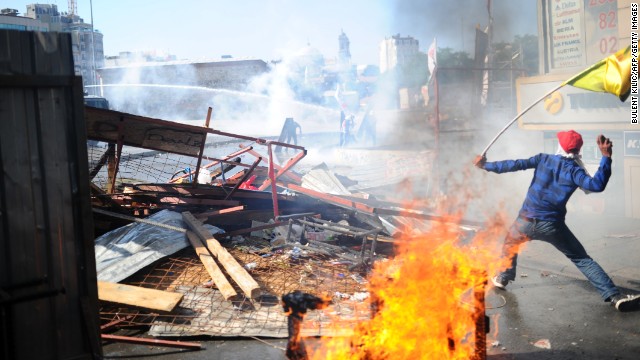 A protester throws a stone during clashes with riot police on June 11.
A protester throws a stone during clashes with riot police on June 11. 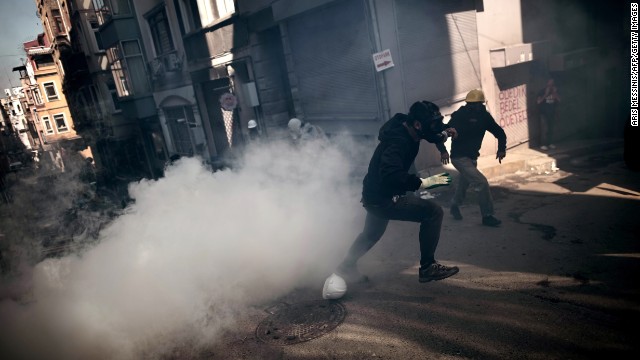 Protesters run from smoke as they clash with police in Istanbul on June 11.
Protesters run from smoke as they clash with police in Istanbul on June 11. 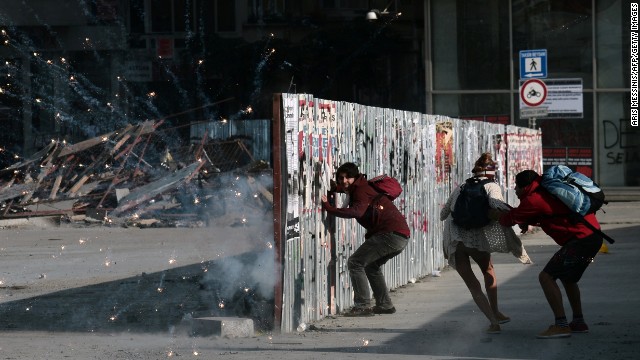 Protesters take cover behind a barricade as fireworks go off nearby on June 11.
Protesters take cover behind a barricade as fireworks go off nearby on June 11. 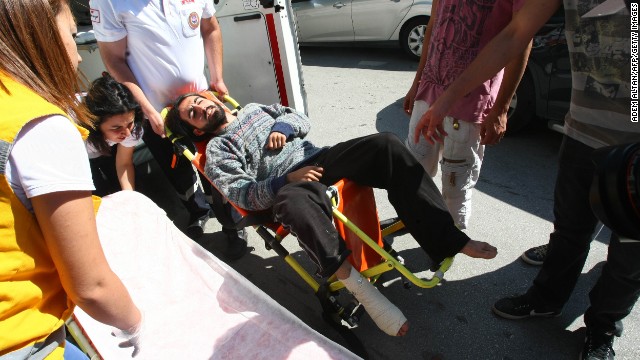 Medics carry Yasin Ayhan, 23, a protester who broke his leg in a raid early Monday, June 10, in Kugulu Park. Riot police doused thousands of protesters in Ankara with tear gas and jets of water for a second straight night.
Medics carry Yasin Ayhan, 23, a protester who broke his leg in a raid early Monday, June 10, in Kugulu Park. Riot police doused thousands of protesters in Ankara with tear gas and jets of water for a second straight night. 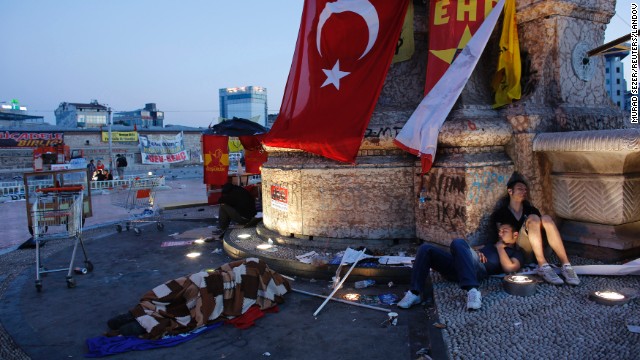 Protesters sleep at Taksim Square in central Istanbul on June 10. Prime Minister Recep Tayyip Erdogan warned protesters who have taken to the streets demanding his resignation that his patience has its limits and compared the unrest with an army attempt six years ago to curb his power.
Protesters sleep at Taksim Square in central Istanbul on June 10. Prime Minister Recep Tayyip Erdogan warned protesters who have taken to the streets demanding his resignation that his patience has its limits and compared the unrest with an army attempt six years ago to curb his power. 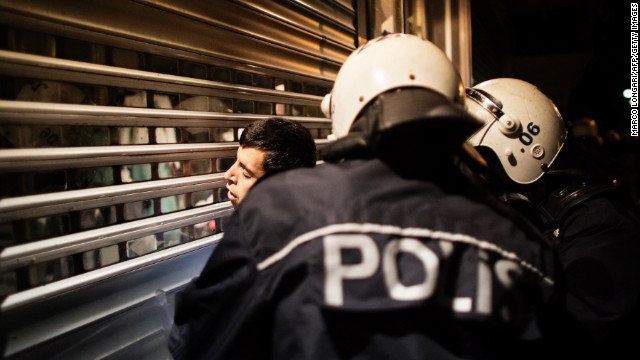 A demonstrator is detained by police officers as protests resumed in Kizilay Square in Ankara on Sunday, June 9.
A demonstrator is detained by police officers as protests resumed in Kizilay Square in Ankara on Sunday, June 9. 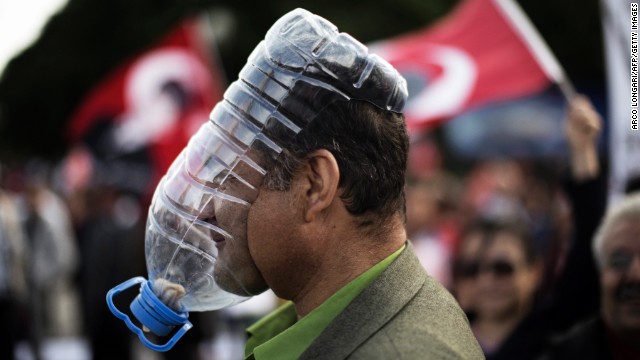 A demonstrator covers his face with a makeshift gas mask during protests in Kizilay Square in Ankara on June 9.
A demonstrator covers his face with a makeshift gas mask during protests in Kizilay Square in Ankara on June 9. 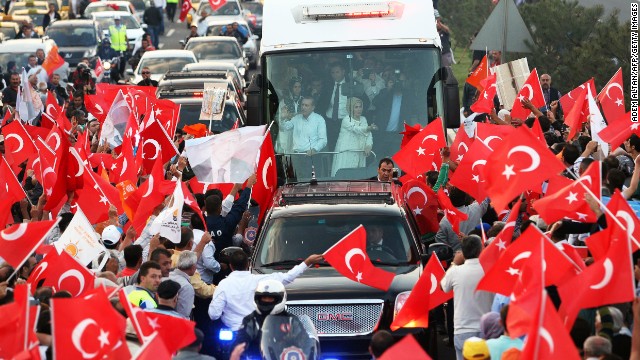 Turkish Prime Minister Recep Tayyip Erdogan, left, and his wife, Emine, wave to supporters upon their arrival in Ankara on June 9. Erdogan told supporters that "even patience has an end" as he went on the offensive against mass protests that have consumed Ankara and Istanbul.
Turkish Prime Minister Recep Tayyip Erdogan, left, and his wife, Emine, wave to supporters upon their arrival in Ankara on June 9. Erdogan told supporters that "even patience has an end" as he went on the offensive against mass protests that have consumed Ankara and Istanbul. 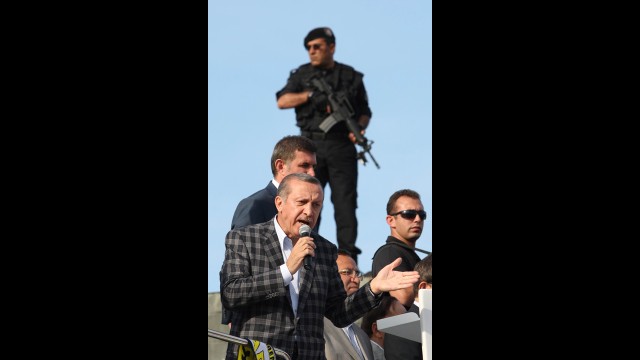 Erdogan addresses supporters from the top of a bus as police stand guard at Esenboga International Airport in Ankara on June 9.
Erdogan addresses supporters from the top of a bus as police stand guard at Esenboga International Airport in Ankara on June 9. 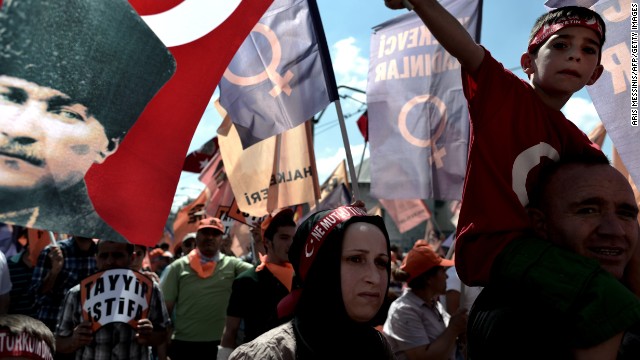 Protesters gather during a demonstration at Taksim Square in Istanbul, on June 9.
Protesters gather during a demonstration at Taksim Square in Istanbul, on June 9. 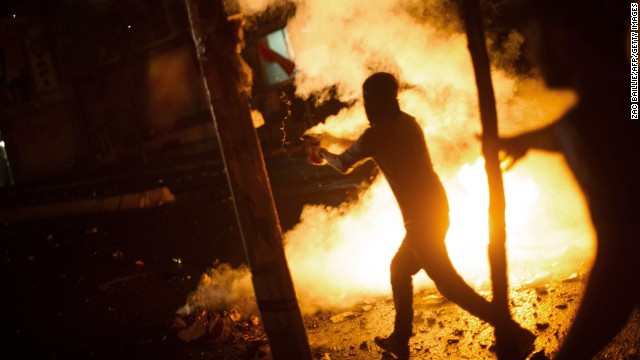 A demonstrator runs toward police during clashes with riot police in Istanbul, on Saturday, June 8.
A demonstrator runs toward police during clashes with riot police in Istanbul, on Saturday, June 8. 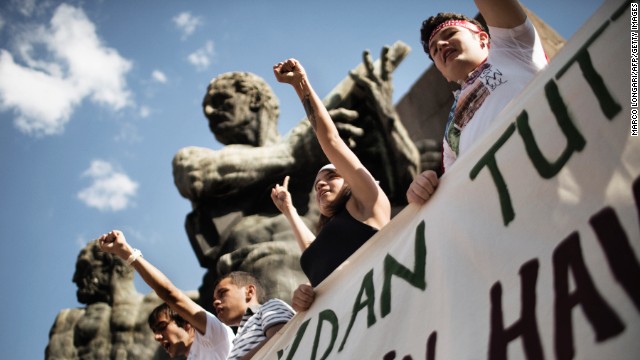 Demonstrators shout slogans as they gather at Kizilay Square in Ankara, Turkey, on June 8.
Demonstrators shout slogans as they gather at Kizilay Square in Ankara, Turkey, on June 8. 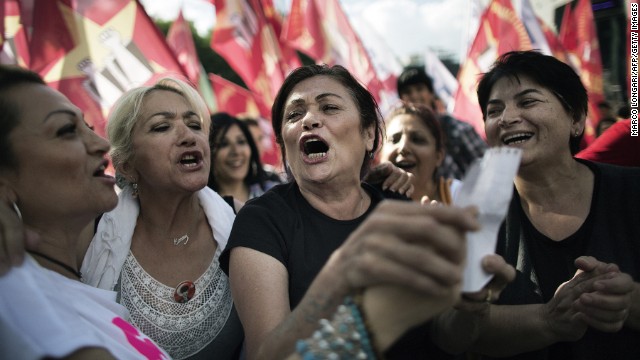 Women sing as people gather at Kizilay Square in Ankara on June 8.
Women sing as people gather at Kizilay Square in Ankara on June 8. 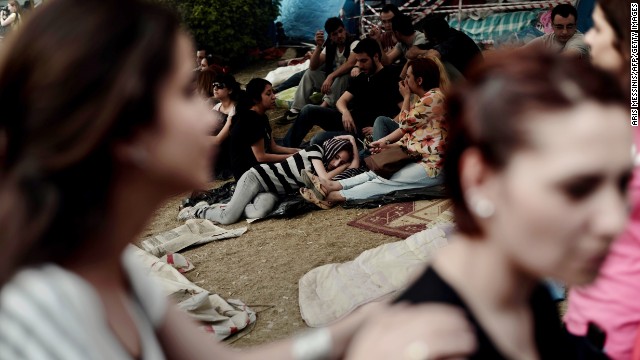 Protesters rest in Gezi Park next to Taksim Square during a demonstration in Istanbul on Friday, June 7.
Protesters rest in Gezi Park next to Taksim Square during a demonstration in Istanbul on Friday, June 7. 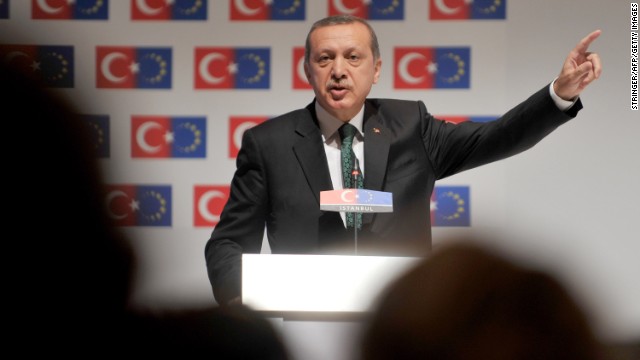 Prime Minister Recep Tayyip Erdogan speaks during the opening session of the Ministry for European Union Affairs Conference on June 7 in Istanbul. Erdogan said today his Islamic-rooted government was open to "democratic demands" and hit back at EU criticism of his government's handling of a week of unrest.
Prime Minister Recep Tayyip Erdogan speaks during the opening session of the Ministry for European Union Affairs Conference on June 7 in Istanbul. Erdogan said today his Islamic-rooted government was open to "democratic demands" and hit back at EU criticism of his government's handling of a week of unrest. 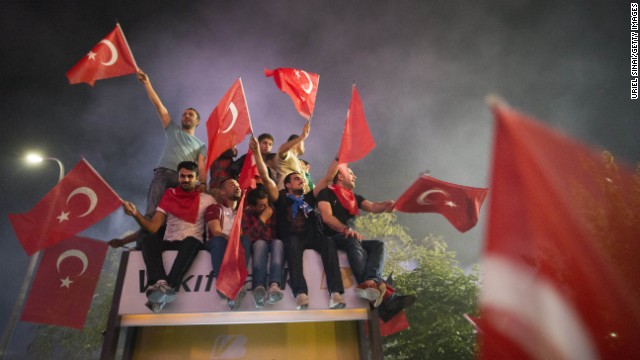 Supporters of Erdogan wave the Turkish flag upon the prime minister's arrival in Istanbul, on June 7.
Supporters of Erdogan wave the Turkish flag upon the prime minister's arrival in Istanbul, on June 7. 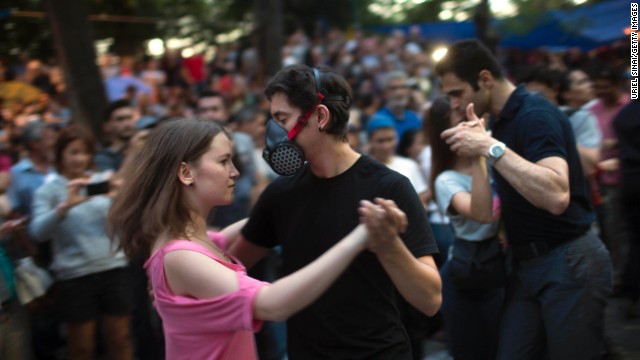 Protestors dance at Gezi Park in Taksim Square on Thursday, June 6.
Protestors dance at Gezi Park in Taksim Square on Thursday, June 6. 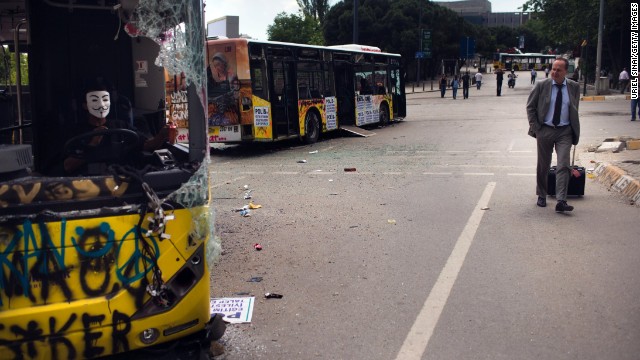 A man walks past damaged buses near Taksim Square on Thursday, June 6, in Istanbul, Turkey.
A man walks past damaged buses near Taksim Square on Thursday, June 6, in Istanbul, Turkey. 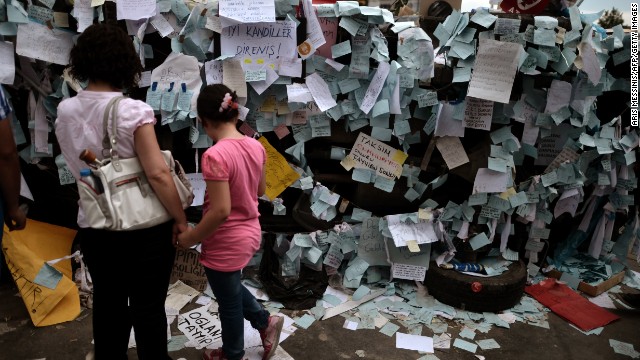 A mother and her daughter read notes placed by protestors on a destroyed car in Taksim Square on June 6. Thousands of striking union members joined the anti-government protests on June 5, marching in Istanbul and Ankara in a sea of red and white union flags, drumming and yelling for Prime Minister Recep Tayyip Erdogan to resign.
A mother and her daughter read notes placed by protestors on a destroyed car in Taksim Square on June 6. Thousands of striking union members joined the anti-government protests on June 5, marching in Istanbul and Ankara in a sea of red and white union flags, drumming and yelling for Prime Minister Recep Tayyip Erdogan to resign. 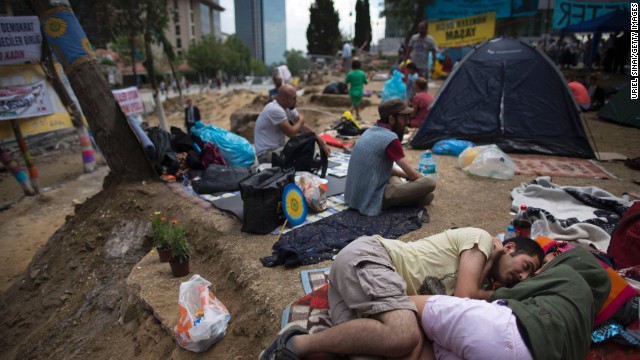 Protestors spend their day at Gezi Park on June 6.
Protestors spend their day at Gezi Park on June 6. 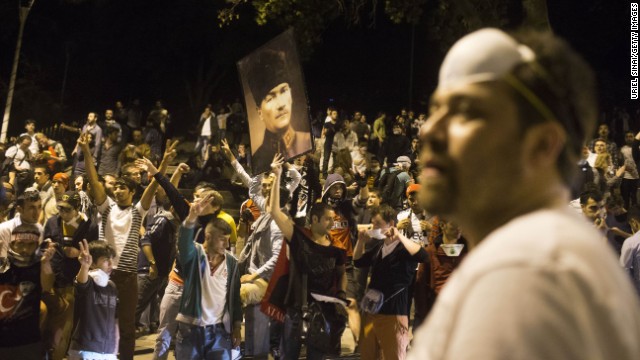 Protestors demonstrate near the office building of Turkish Prime Minister Recep Tayyip Erdogan in Istanbul early on June 6.
Protestors demonstrate near the office building of Turkish Prime Minister Recep Tayyip Erdogan in Istanbul early on June 6. 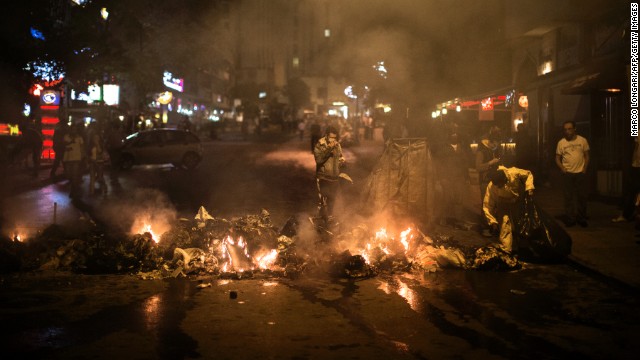 A municipal worker collects garbage set on fire by Turkish protesters in a restaurant district of Ankara on June 5.
A municipal worker collects garbage set on fire by Turkish protesters in a restaurant district of Ankara on June 5. 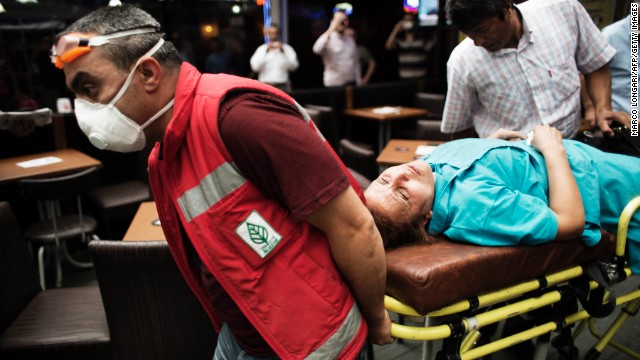 A woman is wheeled away by paramedics during clashes on Kizilay Square in Ankara on Wednesday, June 5.
A woman is wheeled away by paramedics during clashes on Kizilay Square in Ankara on Wednesday, June 5. 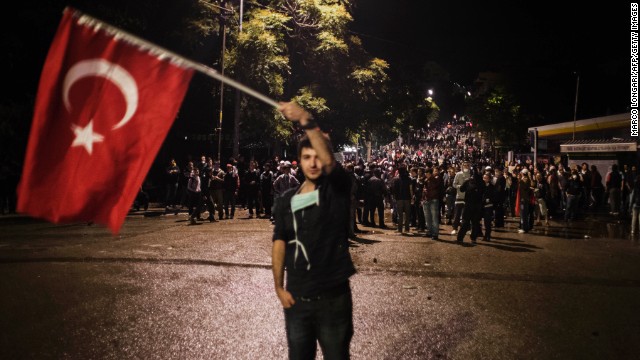 Protesters confront police forces during riots in a restaurant district of Ankara, on June 5.
Protesters confront police forces during riots in a restaurant district of Ankara, on June 5. 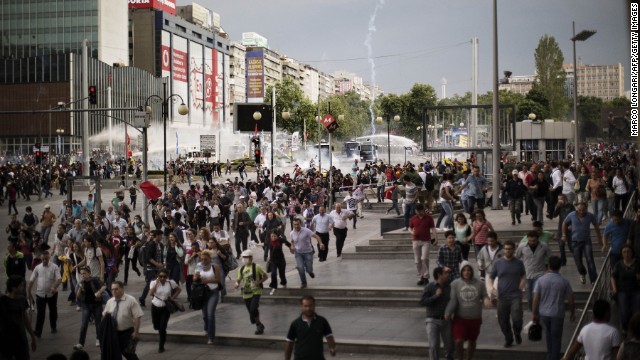 Demonstrators run for cover as police use water cannons and tear gas on the crowd in Ankara on June 5.
Demonstrators run for cover as police use water cannons and tear gas on the crowd in Ankara on June 5. 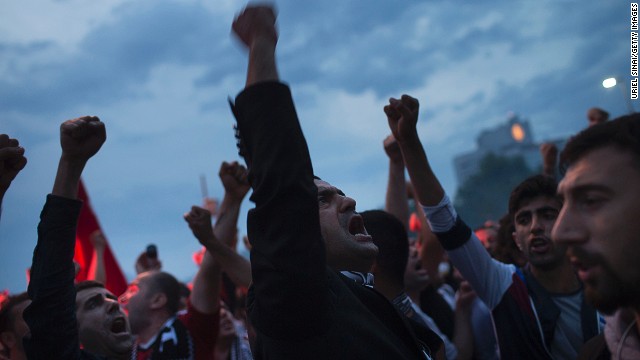 Protesters gather in Taksim Square as they shout slogans while protesting on Tuesday, June 4, in Istanbul, Turkey.
Protesters gather in Taksim Square as they shout slogans while protesting on Tuesday, June 4, in Istanbul, Turkey. 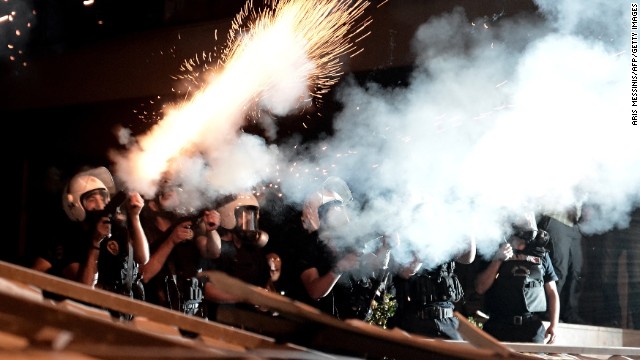 Riot police fire tear gas at demonstrators in Istanbul on June 4.
Riot police fire tear gas at demonstrators in Istanbul on June 4. 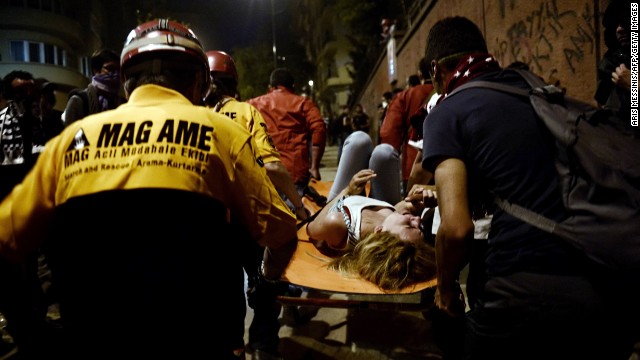 Paramedics carry a woman injured during clashes between demonstrators and riot police in Istanbul on June 4.
Paramedics carry a woman injured during clashes between demonstrators and riot police in Istanbul on June 4. 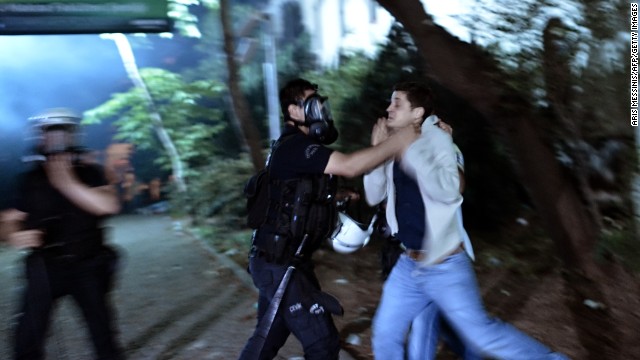 Turkish police detain a demonstrator during clashes in Istanbul on June 4.
Turkish police detain a demonstrator during clashes in Istanbul on June 4. 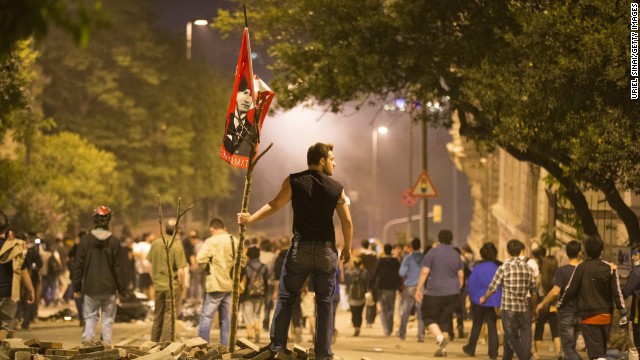 A protester looks on during clashes with Turkish police outside of Prime Minister Recep Tayyip Erdogan's office, near Taksim Square in Istanbul on Tuesday, June 4.
A protester looks on during clashes with Turkish police outside of Prime Minister Recep Tayyip Erdogan's office, near Taksim Square in Istanbul on Tuesday, June 4. 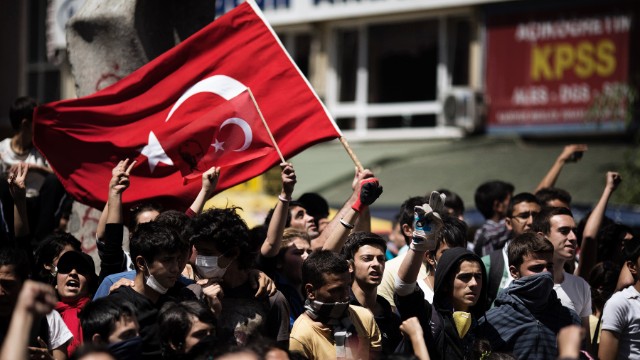 Demonstrators wave their national flag on June 4, during a protest in Ankara.
Demonstrators wave their national flag on June 4, during a protest in Ankara. 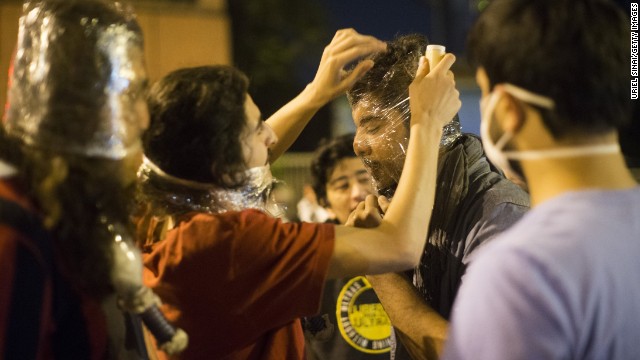 Protesters cover their faces with plastic. After chaotic scenes in the streets Monday that continued late into the night and sent tear gas wafting through the air, the situation was relatively calm on Tuesday morning in Istanbul's central Taksim Square, near the park where the movement began.
Protesters cover their faces with plastic. After chaotic scenes in the streets Monday that continued late into the night and sent tear gas wafting through the air, the situation was relatively calm on Tuesday morning in Istanbul's central Taksim Square, near the park where the movement began. 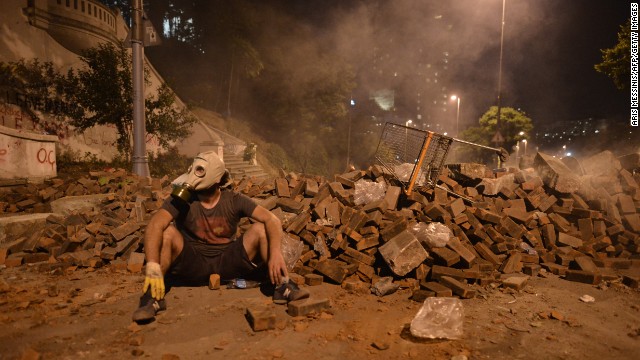 A demonstrator takes cover at a road block between Taksim and Besiktas in Istanbul on June 4.
A demonstrator takes cover at a road block between Taksim and Besiktas in Istanbul on June 4. 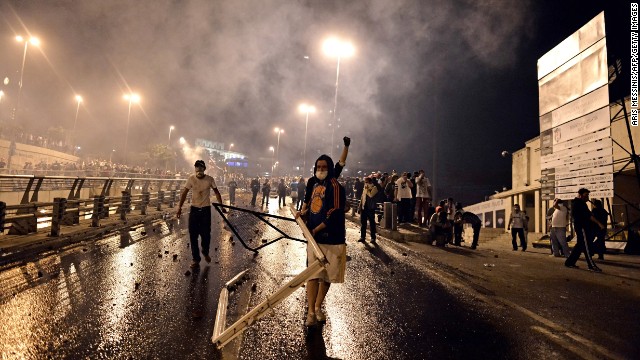 Protesters clash with riot police between Taksim and Besiktas in Istanbul on Monday, June 3.
Protesters clash with riot police between Taksim and Besiktas in Istanbul on Monday, June 3. 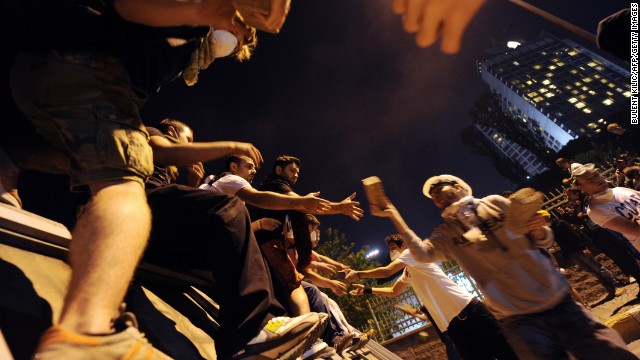 Protestors pass bricks for building barricades during clashes with riot police in Istanbul on June 3.
Protestors pass bricks for building barricades during clashes with riot police in Istanbul on June 3. 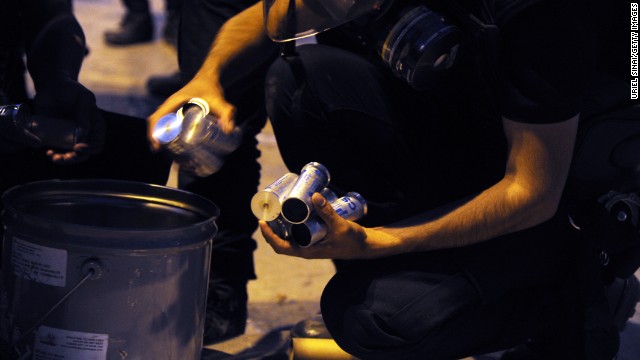 Riot policemen unload tear gas during clashes in Istanbul on June 3.
Riot policemen unload tear gas during clashes in Istanbul on June 3. 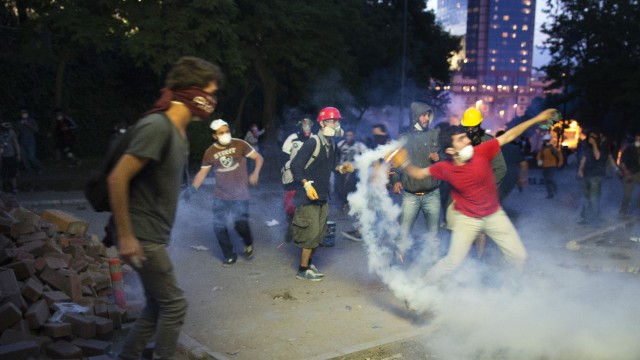 Protesters throw riot police's tear gas back at them in Istanbul on June 3.
Protesters throw riot police's tear gas back at them in Istanbul on June 3. 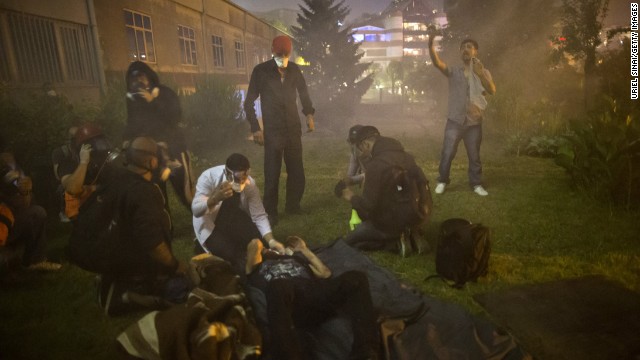 Protester wounds are treated during clashes in Istanbul on June 3.
Protester wounds are treated during clashes in Istanbul on June 3. 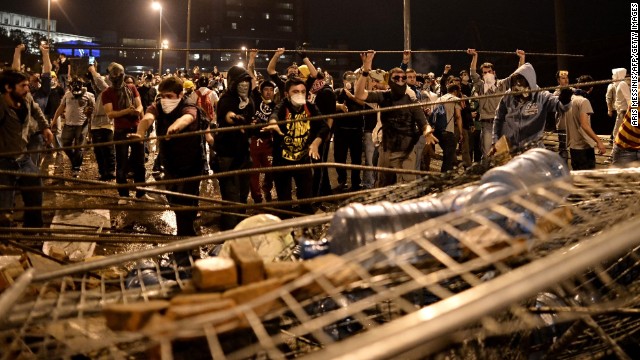 Demonstrators set up road blocks between Taksim and Besiktas. Barricades remain up around the square, and Erdogan's opponents appear determined to continue the demonstrations despite the prime minister's comment on June 3 that he expects the situation to return to normal "within a few days."
Demonstrators set up road blocks between Taksim and Besiktas. Barricades remain up around the square, and Erdogan's opponents appear determined to continue the demonstrations despite the prime minister's comment on June 3 that he expects the situation to return to normal "within a few days." 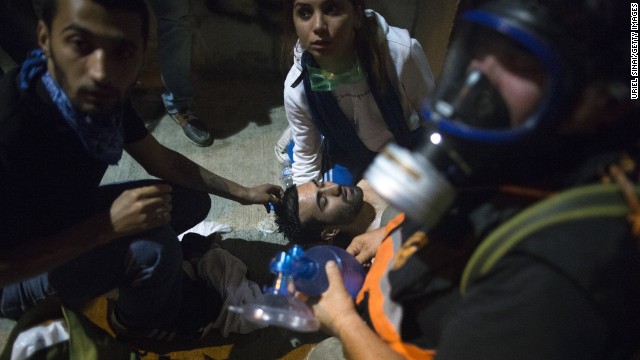 A medical team tends to a protester. The Turkish Medical Association claimed that at least 3,195 people had been injured in clashes on June 1 and June 2. Only 26 of them were in serious or critical condition, it said.
A medical team tends to a protester. The Turkish Medical Association claimed that at least 3,195 people had been injured in clashes on June 1 and June 2. Only 26 of them were in serious or critical condition, it said. 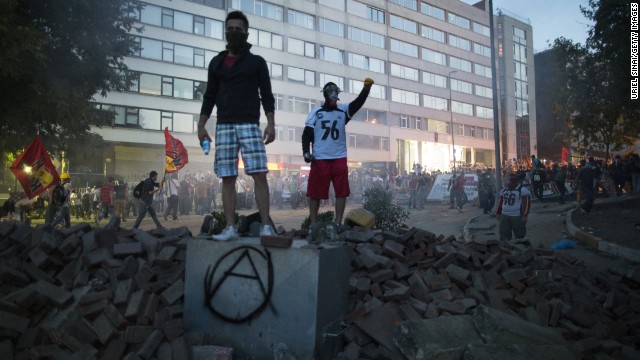 Protesters stand atop a pile of rubble during clashes with Turkish police on Monday, June 3.
Protesters stand atop a pile of rubble during clashes with Turkish police on Monday, June 3. 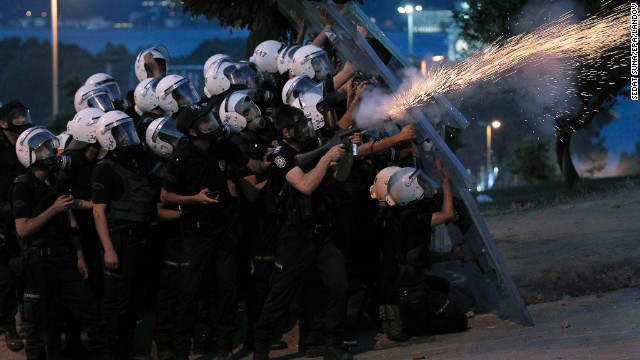 Turkish riot police fire tear gas canisters to disperse protesters near Taksim Square on June 3.
Turkish riot police fire tear gas canisters to disperse protesters near Taksim Square on June 3. 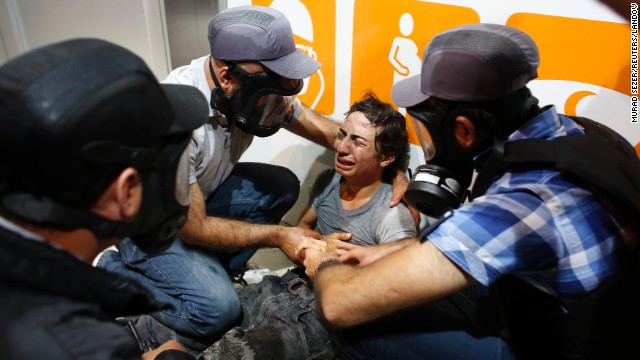 Police officers tend to a demonstrator during the violent clashes in Istanbul on June 3.
Police officers tend to a demonstrator during the violent clashes in Istanbul on June 3. 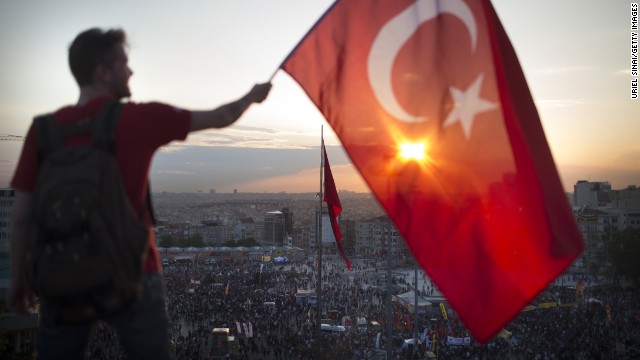 A protester waves the Turkish flag from a rooftop at Taksim Square on June 3 as large crowds continue to demonstrate below.
A protester waves the Turkish flag from a rooftop at Taksim Square on June 3 as large crowds continue to demonstrate below. 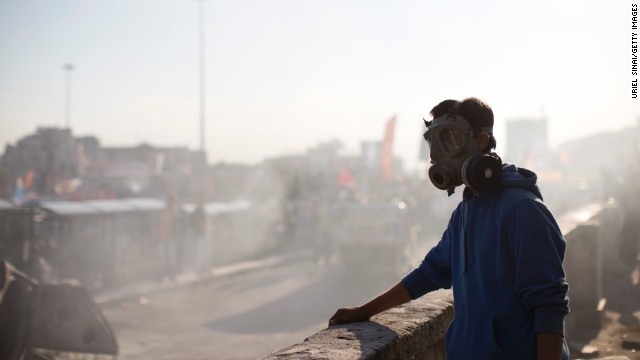 A protester wears a gas mask as smoke from a burned car fills the air at Taksim Square on June 3.
A protester wears a gas mask as smoke from a burned car fills the air at Taksim Square on June 3. 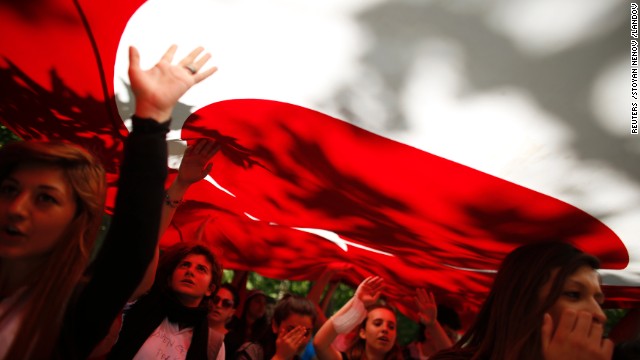 Despite Turkish Prime Minister Recep Tayyip Erdogan's call for calm on Monday, June 3, protests continued in Istanbul. Protesters carry the Turkish flag and shout against the government in Gezi Park near central Istanbul.
Despite Turkish Prime Minister Recep Tayyip Erdogan's call for calm on Monday, June 3, protests continued in Istanbul. Protesters carry the Turkish flag and shout against the government in Gezi Park near central Istanbul. 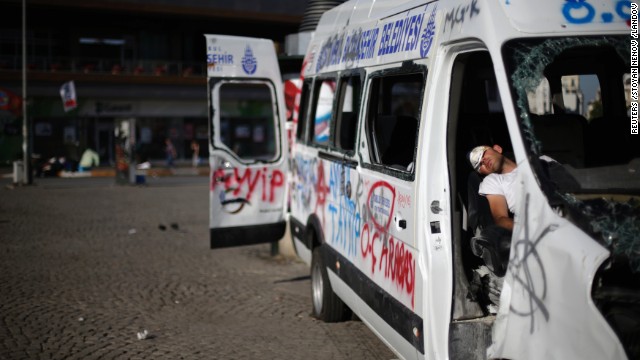 After protests that lasted until the early morning, a protester sleeps in a damaged and vandalized vehicle in Taksim Square on June 3. Protests showed no sign of letting up on Monday, almost a week after a peaceful sit-in was met with a police crackdown, igniting the biggest anti-government riots the city has seen in a decade.
After protests that lasted until the early morning, a protester sleeps in a damaged and vandalized vehicle in Taksim Square on June 3. Protests showed no sign of letting up on Monday, almost a week after a peaceful sit-in was met with a police crackdown, igniting the biggest anti-government riots the city has seen in a decade. 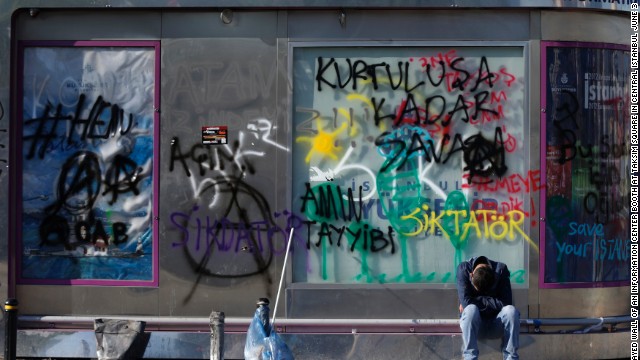 A tired protester rests in front of the graffiti-sprayed wall of an information booth at Taksim Square in central Istanbul on June 3.
A tired protester rests in front of the graffiti-sprayed wall of an information booth at Taksim Square in central Istanbul on June 3. 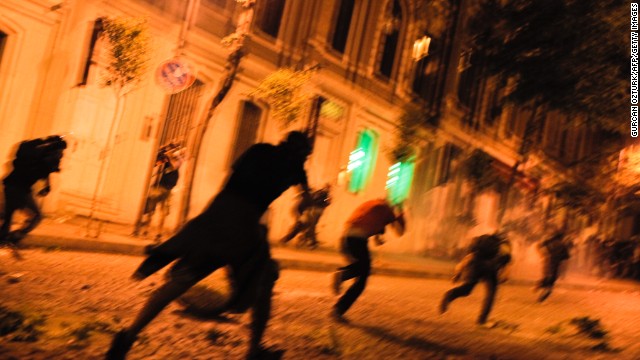 Turkish protesters clash with riot police near the prime minister's office between Taksim and Besiktas early June 3.
Turkish protesters clash with riot police near the prime minister's office between Taksim and Besiktas early June 3. 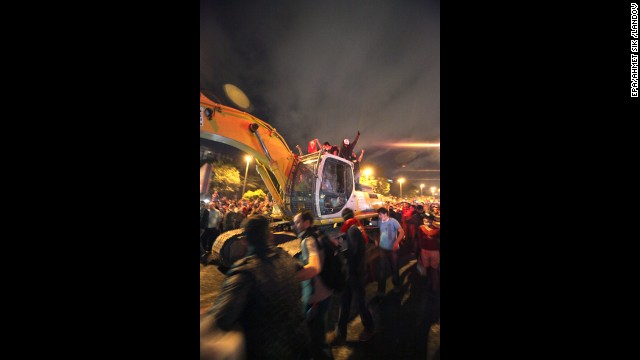 Protesters drive an excavator toward Turkish riot police as they make their way to Erdogan's office on June 3.
Protesters drive an excavator toward Turkish riot police as they make their way to Erdogan's office on June 3. 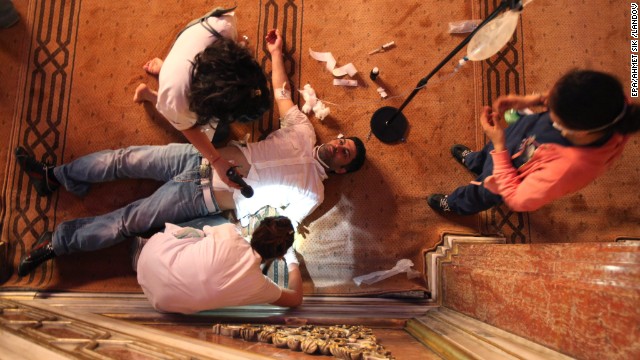 During the clashes, volunteer doctors helped injured protesters in a mosque on June 3.
During the clashes, volunteer doctors helped injured protesters in a mosque on June 3. 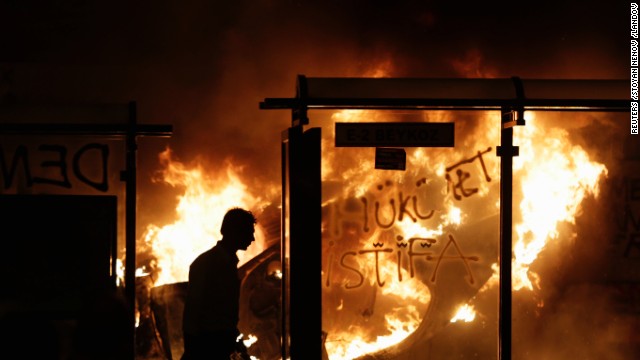 A protester is silhouetted by a burning car at Taksim Square during clashes in the early morning of June 3.
A protester is silhouetted by a burning car at Taksim Square during clashes in the early morning of June 3. 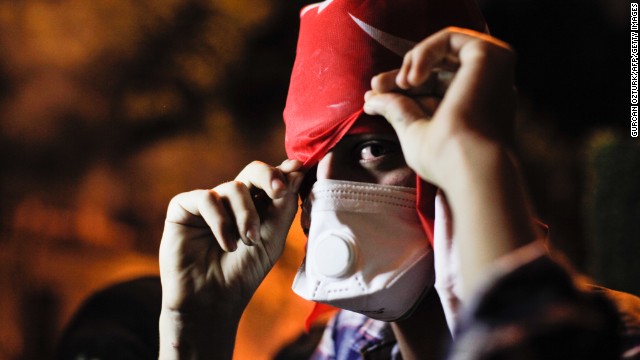 A protester covers his face on June 3 near Erdogan's office in Istanbul.
A protester covers his face on June 3 near Erdogan's office in Istanbul. 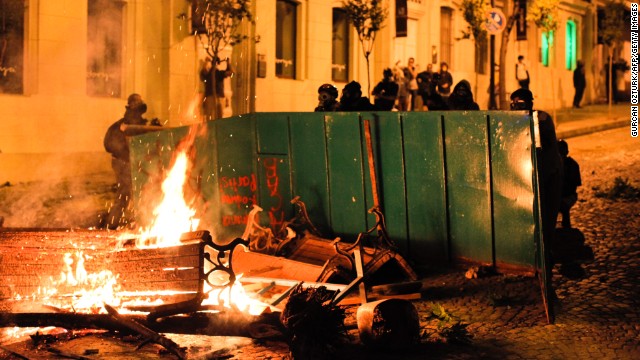 Protesters clash with riot police in Istanbul on June 3.
Protesters clash with riot police in Istanbul on June 3. 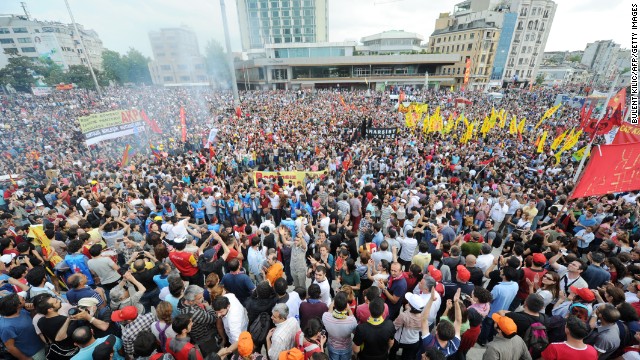 Protesters gather in Taksim Square in Istanbul on Sunday, June 2.
Protesters gather in Taksim Square in Istanbul on Sunday, June 2. 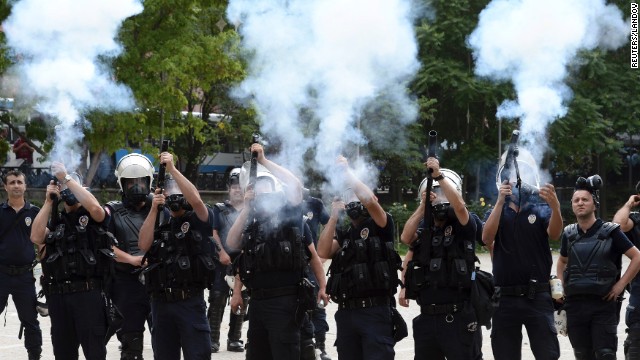 Riot police fire tear gas during a protest against Turkey's Prime Minister Recep Tayyip Erdogan and his ruling AK Party in central Ankara on June 2. Sparked by the events in Istanbul, general anti-government protests have sprung up in Ankara.
Riot police fire tear gas during a protest against Turkey's Prime Minister Recep Tayyip Erdogan and his ruling AK Party in central Ankara on June 2. Sparked by the events in Istanbul, general anti-government protests have sprung up in Ankara. 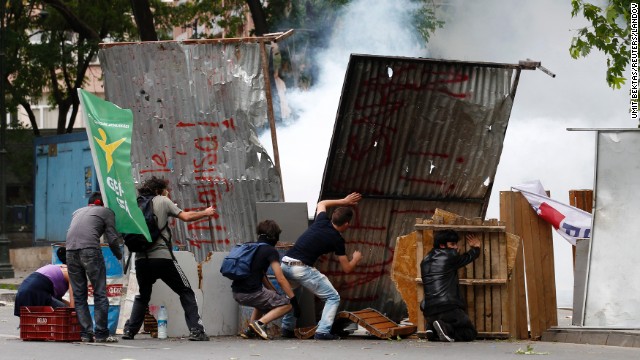 Demonstrators hide behind makeshift shields during clashes with Turkish riot police in Ankara on June 2.
Demonstrators hide behind makeshift shields during clashes with Turkish riot police in Ankara on June 2. 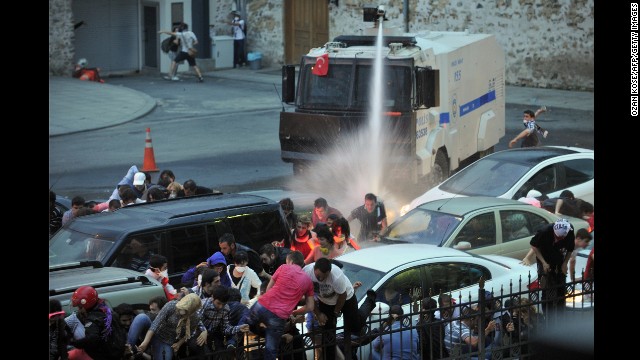 Police use a water cannon to disperse protesters outside Turkish Prime Minister Recep Tayyip Erdogan's working office in Istanbul on June 2.
Police use a water cannon to disperse protesters outside Turkish Prime Minister Recep Tayyip Erdogan's working office in Istanbul on June 2. 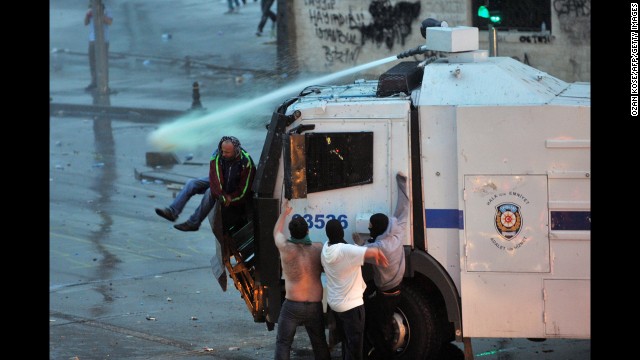 Protesters cling to a police vehicle mounted with a water canon in Istanbul on June 2.
Protesters cling to a police vehicle mounted with a water canon in Istanbul on June 2. 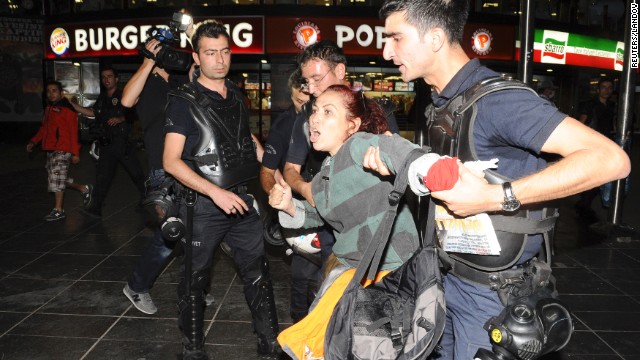 Turkish police detain a protester during demonstrations in Ankara on June 2.
Turkish police detain a protester during demonstrations in Ankara on June 2. 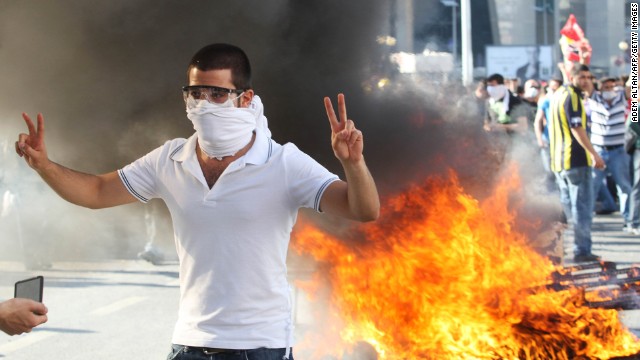 A protester flashes a victory sign as he takes part in a demonstration in Ankara on Saturday, June 1 in support of the protests in Istanbul against government plans to demolish a park.
A protester flashes a victory sign as he takes part in a demonstration in Ankara on Saturday, June 1 in support of the protests in Istanbul against government plans to demolish a park. 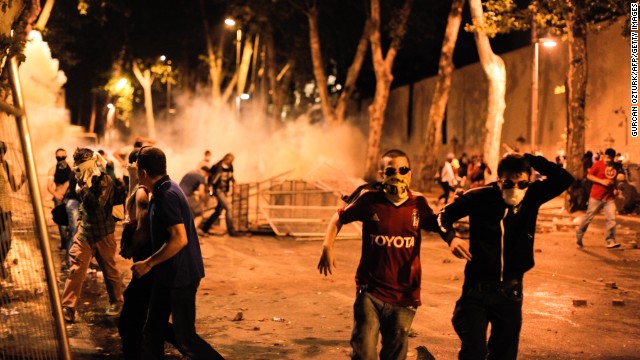 Protesters clash with riot police in Istanbul, Turkey, on Saturday, June 1.
Protesters clash with riot police in Istanbul, Turkey, on Saturday, June 1. 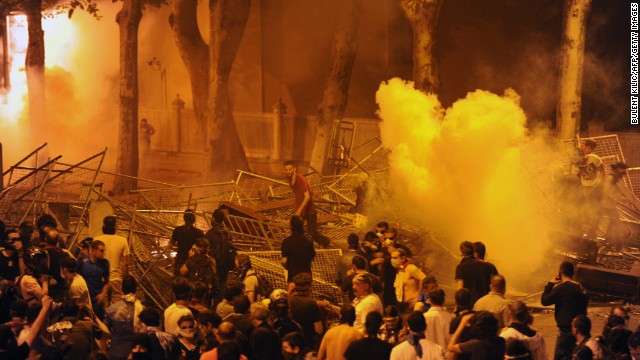 Protesters clash with riot police near Gezi Park on June 1. Earlier this week, several dozen activists tried to stage a sit-in at the park, the last bit of green space left in Istanbul's Taksim Square, the city's transit and commercial hub.
Protesters clash with riot police near Gezi Park on June 1. Earlier this week, several dozen activists tried to stage a sit-in at the park, the last bit of green space left in Istanbul's Taksim Square, the city's transit and commercial hub. 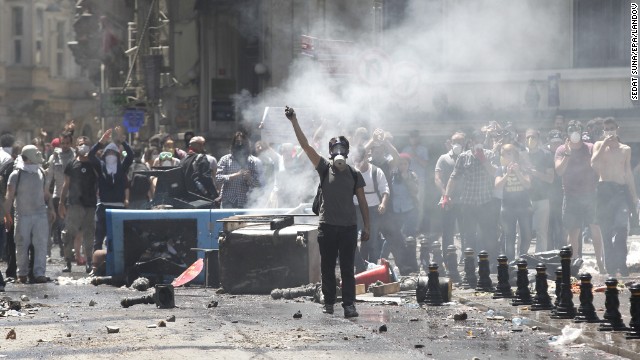 Turkish protesters wearing gas masks face off against riot police near Istanbul's Taksim Square on June 1.
Turkish protesters wearing gas masks face off against riot police near Istanbul's Taksim Square on June 1. 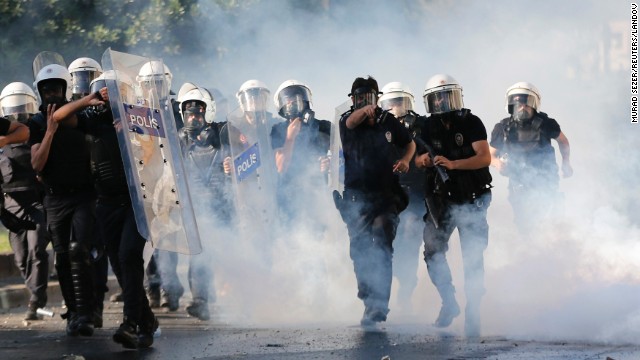 Riot police use tear gas in an attempt to disperse the crowd of demonstrators on June 1.
Riot police use tear gas in an attempt to disperse the crowd of demonstrators on June 1. 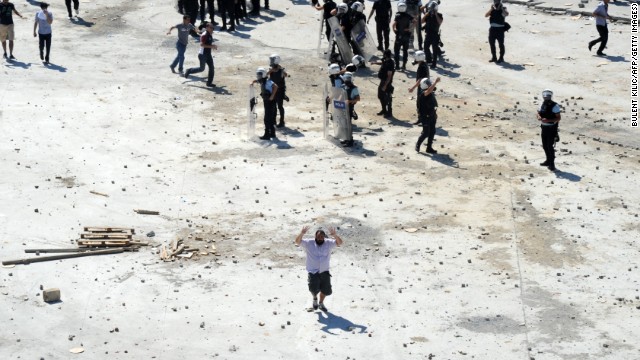 A man flees the clashes between Turkish protestors and riot police on June 1. On Friday, May 31, riot police stormed the growing camp in Gezi Park with water cannons and tear gas, pushing protesters into surrounding streets and triggering the clashes that have continued for more than 24 hours.
A man flees the clashes between Turkish protestors and riot police on June 1. On Friday, May 31, riot police stormed the growing camp in Gezi Park with water cannons and tear gas, pushing protesters into surrounding streets and triggering the clashes that have continued for more than 24 hours. 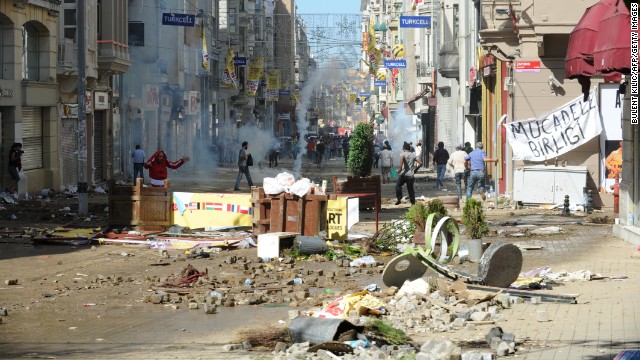 The clashes damaged surrounding businesses in Istanbul and forced them to close on June 1.
The clashes damaged surrounding businesses in Istanbul and forced them to close on June 1. 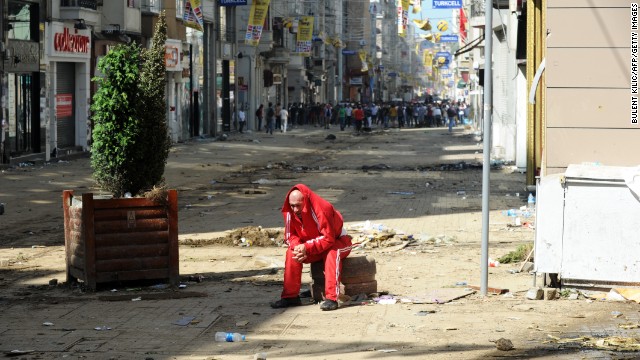 A man catches his breath behind the line where clashes are taking place on June 1.
A man catches his breath behind the line where clashes are taking place on June 1. 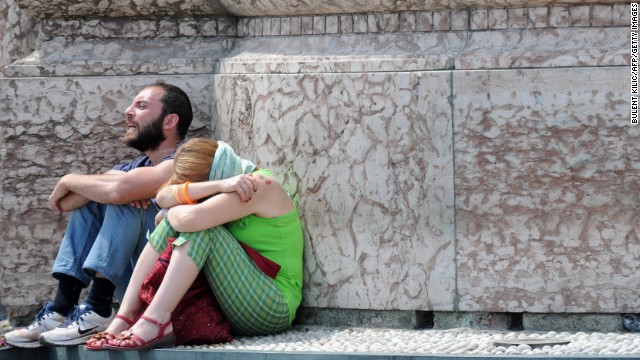 A pair of tourists gasp for air as riot police use tear gas and water cannons the fend off the demonstrators. Turkish security forces allowed small groups of pedestrians to travel through the square.
A pair of tourists gasp for air as riot police use tear gas and water cannons the fend off the demonstrators. Turkish security forces allowed small groups of pedestrians to travel through the square. 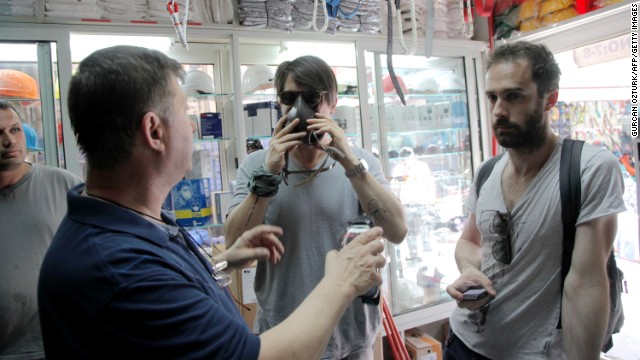 Protesters buy gas masks from a local shop near the square on June 1.
Protesters buy gas masks from a local shop near the square on June 1. 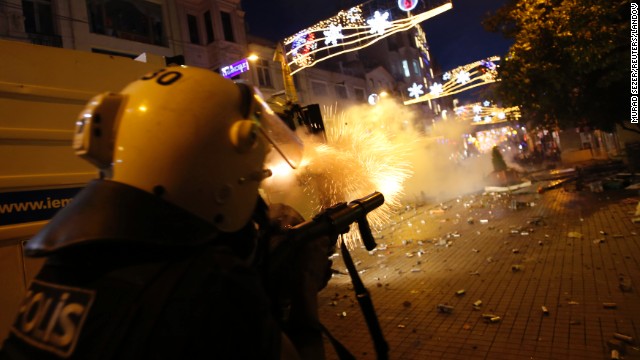 Riot police fire tear gas into the crowd of protesters overnight on Friday, May 31.
Riot police fire tear gas into the crowd of protesters overnight on Friday, May 31. 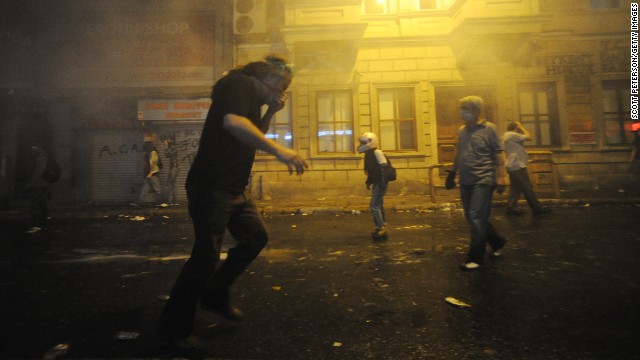 Demonstrators set up barricades and build a fire as they clash with Turkish officers on May 31.
Demonstrators set up barricades and build a fire as they clash with Turkish officers on May 31. 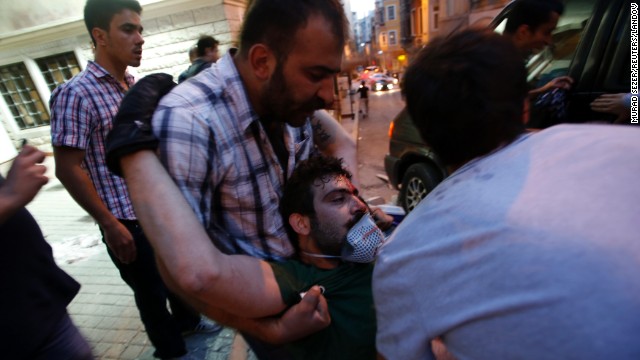 Friends carry an injured protester on May 31. More than a dozen people have been injured in the clashes.
Friends carry an injured protester on May 31. More than a dozen people have been injured in the clashes. 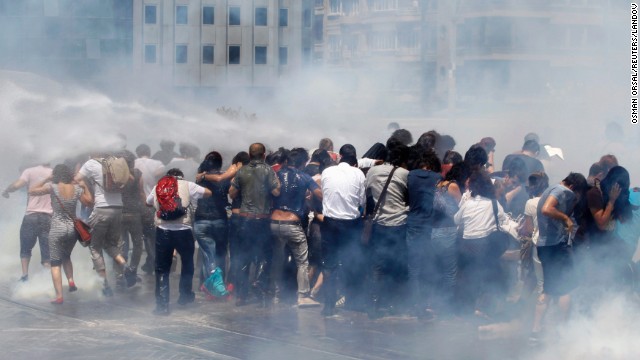 Riot police use tear gas and water cannons to disperse a crowd at Taksim Square on May 31.
Riot police use tear gas and water cannons to disperse a crowd at Taksim Square on May 31. 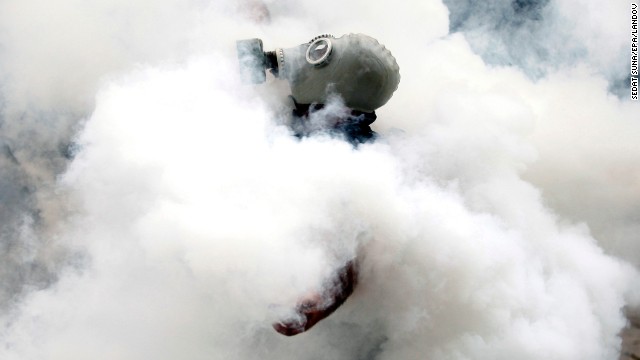 An activist wearing a gas mask is enveloped in a cloud of tear gas on May 31.
An activist wearing a gas mask is enveloped in a cloud of tear gas on May 31. 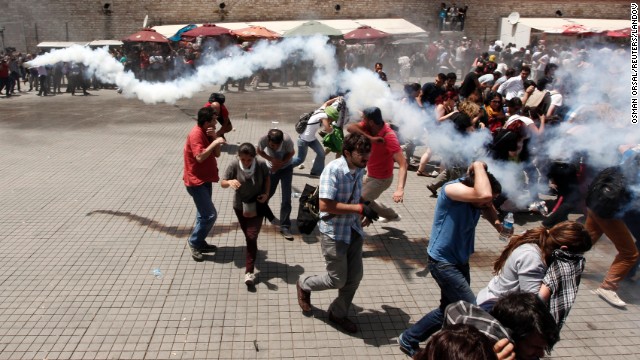 A crowd scatters during clashes on May 31, as one demonstrator throws back the tear gas canister that was launched by riot police.
A crowd scatters during clashes on May 31, as one demonstrator throws back the tear gas canister that was launched by riot police. 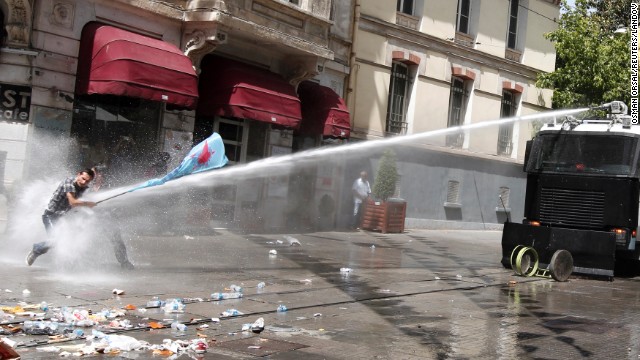 Protestors brace themselves as they are fired upon with a water canon by Turkish police forces.
Protestors brace themselves as they are fired upon with a water canon by Turkish police forces. 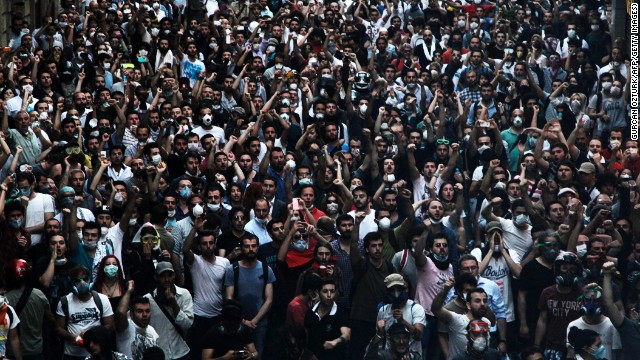 A large group of demonstrators gather to protest the demolition of Gezi Park in Taksim Square on May 31.
A large group of demonstrators gather to protest the demolition of Gezi Park in Taksim Square on May 31. 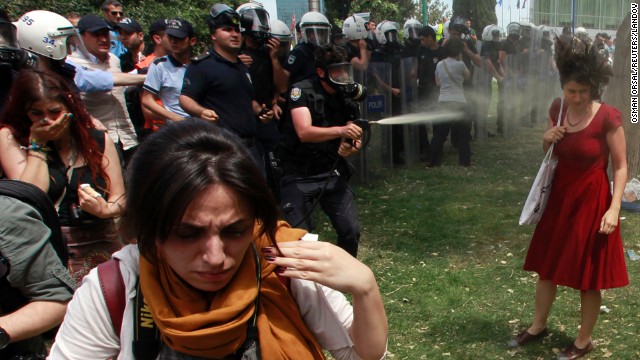 A Turkish riot policeman uses tear gas in Taksim Square on May 28. Demonstrations in Turkey Demonstrations in Turkey Demonstrations in Turkey Demonstrations in Turkey Demonstrations in Turkey Demonstrations in Turkey Demonstrations in Turkey Demonstrations in Turkey Demonstrations in Turkey Demonstrations in Turkey Demonstrations in Turkey Demonstrations in Turkey Demonstrations in Turkey Demonstrations in Turkey Demonstrations in Turkey Demonstrations in Turkey Demonstrations in Turkey Demonstrations in Turkey Demonstrations in Turkey Demonstrations in Turkey Demonstrations in Turkey Demonstrations in Turkey Demonstrations in Turkey Demonstrations in Turkey Demonstrations in Turkey Demonstrations in Turkey Demonstrations in Turkey Demonstrations in Turkey Demonstrations in Turkey Demonstrations in Turkey Demonstrations in Turkey Demonstrations in Turkey Demonstrations in Turkey Demonstrations in Turkey Demonstrations in Turkey Demonstrations in Turkey Demonstrations in Turkey Demonstrations in Turkey Demonstrations in Turkey Demonstrations in Turkey Demonstrations in Turkey Demonstrations in Turkey Demonstrations in Turkey Demonstrations in Turkey Demonstrations in Turkey Demonstrations in Turkey Demonstrations in Turkey Demonstrations in Turkey Demonstrations in Turkey Demonstrations in Turkey Demonstrations in Turkey Demonstrations in Turkey Demonstrations in Turkey Demonstrations in Turkey Demonstrations in Turkey Demonstrations in Turkey Demonstrations in Turkey Demonstrations in Turkey Demonstrations in Turkey Demonstrations in Turkey Demonstrations in Turkey Demonstrations in Turkey Demonstrations in Turkey Demonstrations in Turkey Demonstrations in Turkey Demonstrations in Turkey Demonstrations in Turkey Demonstrations in Turkey Demonstrations in Turkey Demonstrations in Turkey Demonstrations in Turkey Demonstrations in Turkey Demonstrations in Turkey Demonstrations in Turkey Demonstrations in Turkey Demonstrations in Turkey Demonstrations in Turkey Demonstrations in Turkey Demonstrations in Turkey Demonstrations in Turkey Demonstrations in Turkey Demonstrations in Turkey Demonstrations in Turkey Demonstrations in Turkey Demonstrations in Turkey Demonstrations in Turkey Demonstrations in Turkey Demonstrations in Turkey Demonstrations in Turkey Demonstrations in Turkey Demonstrations in Turkey Demonstrations in Turkey Demonstrations in Turkey Demonstrations in Turkey Demonstrations in Turkey Demonstrations in Turkey Demonstrations in Turkey Demonstrations in Turkey Demonstrations in Turkey Demonstrations in Turkey Demonstrations in Turkey Demonstrations in Turkey Demonstrations in Turkey Demonstrations in Turkey Demonstrations in Turkey Demonstrations in Turkey Demonstrations in Turkey Demonstrations in Turkey Demonstrations in Turkey Demonstrations in Turkey Demonstrations in Turkey Demonstrations in Turkey Demonstrations in Turkey Demonstrations in Turkey Demonstrations in Turkey Demonstrations in Turkey Demonstrations in Turkey Demonstrations in Turkey Demonstrations in Turkey Demonstrations in Turkey Demonstrations in Turkey Demonstrations in Turkey Demonstrations in Turkey HIDE CAPTION << <
A Turkish riot policeman uses tear gas in Taksim Square on May 28. Demonstrations in Turkey Demonstrations in Turkey Demonstrations in Turkey Demonstrations in Turkey Demonstrations in Turkey Demonstrations in Turkey Demonstrations in Turkey Demonstrations in Turkey Demonstrations in Turkey Demonstrations in Turkey Demonstrations in Turkey Demonstrations in Turkey Demonstrations in Turkey Demonstrations in Turkey Demonstrations in Turkey Demonstrations in Turkey Demonstrations in Turkey Demonstrations in Turkey Demonstrations in Turkey Demonstrations in Turkey Demonstrations in Turkey Demonstrations in Turkey Demonstrations in Turkey Demonstrations in Turkey Demonstrations in Turkey Demonstrations in Turkey Demonstrations in Turkey Demonstrations in Turkey Demonstrations in Turkey Demonstrations in Turkey Demonstrations in Turkey Demonstrations in Turkey Demonstrations in Turkey Demonstrations in Turkey Demonstrations in Turkey Demonstrations in Turkey Demonstrations in Turkey Demonstrations in Turkey Demonstrations in Turkey Demonstrations in Turkey Demonstrations in Turkey Demonstrations in Turkey Demonstrations in Turkey Demonstrations in Turkey Demonstrations in Turkey Demonstrations in Turkey Demonstrations in Turkey Demonstrations in Turkey Demonstrations in Turkey Demonstrations in Turkey Demonstrations in Turkey Demonstrations in Turkey Demonstrations in Turkey Demonstrations in Turkey Demonstrations in Turkey Demonstrations in Turkey Demonstrations in Turkey Demonstrations in Turkey Demonstrations in Turkey Demonstrations in Turkey Demonstrations in Turkey Demonstrations in Turkey Demonstrations in Turkey Demonstrations in Turkey Demonstrations in Turkey Demonstrations in Turkey Demonstrations in Turkey Demonstrations in Turkey Demonstrations in Turkey Demonstrations in Turkey Demonstrations in Turkey Demonstrations in Turkey Demonstrations in Turkey Demonstrations in Turkey Demonstrations in Turkey Demonstrations in Turkey Demonstrations in Turkey Demonstrations in Turkey Demonstrations in Turkey Demonstrations in Turkey Demonstrations in Turkey Demonstrations in Turkey Demonstrations in Turkey Demonstrations in Turkey Demonstrations in Turkey Demonstrations in Turkey Demonstrations in Turkey Demonstrations in Turkey Demonstrations in Turkey Demonstrations in Turkey Demonstrations in Turkey Demonstrations in Turkey Demonstrations in Turkey Demonstrations in Turkey Demonstrations in Turkey Demonstrations in Turkey Demonstrations in Turkey Demonstrations in Turkey Demonstrations in Turkey Demonstrations in Turkey Demonstrations in Turkey Demonstrations in Turkey Demonstrations in Turkey Demonstrations in Turkey Demonstrations in Turkey Demonstrations in Turkey Demonstrations in Turkey Demonstrations in Turkey Demonstrations in Turkey Demonstrations in Turkey Demonstrations in Turkey Demonstrations in Turkey Demonstrations in Turkey Demonstrations in Turkey Demonstrations in Turkey Demonstrations in Turkey Demonstrations in Turkey Demonstrations in Turkey Demonstrations in Turkey Demonstrations in Turkey Demonstrations in Turkey Demonstrations in Turkey Demonstrations in Turkey HIDE CAPTION << <
{ 0 comments... read them below or add one }
Post a Comment